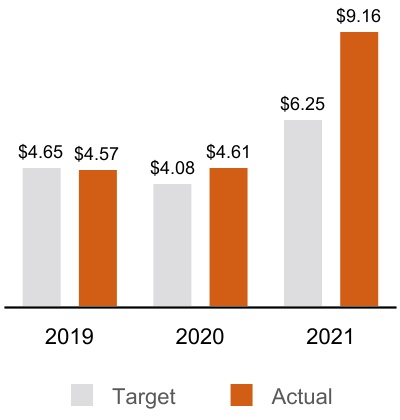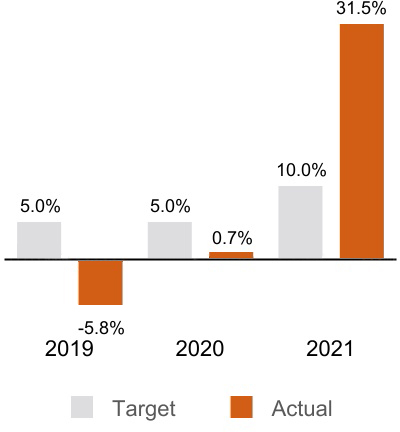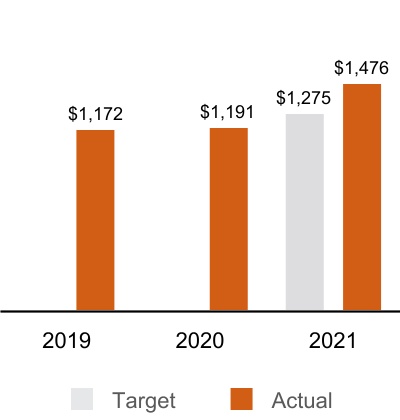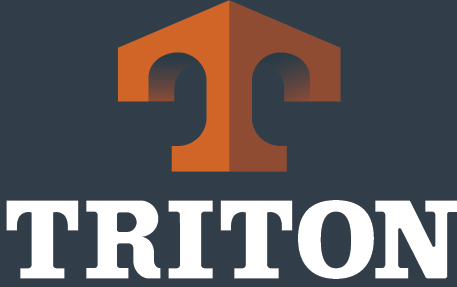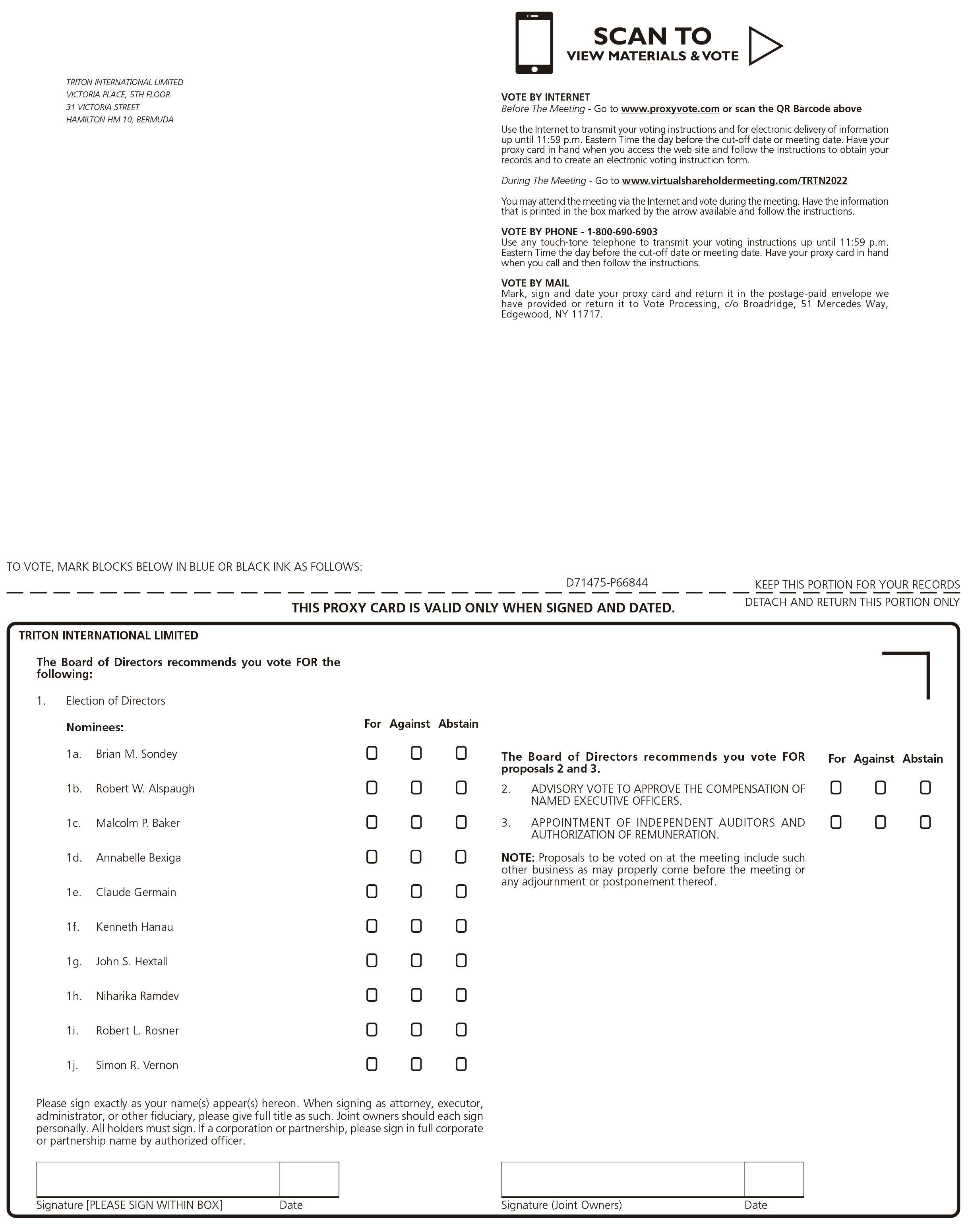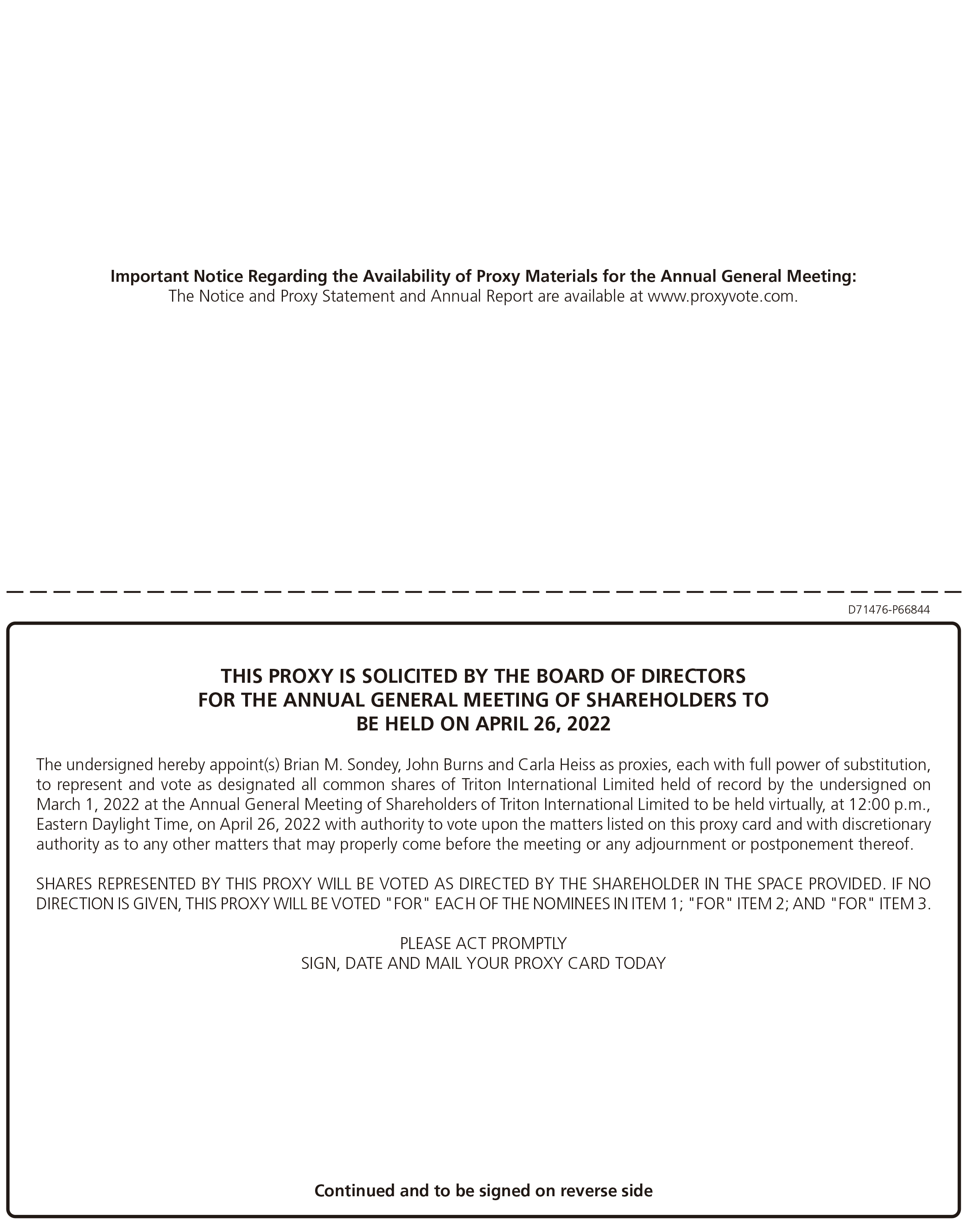UNITED STATES
SECURITIES AND EXCHANGE COMMISSION
WASHINGTON, D.C. 20549
SCHEDULE 14A
Proxy Statement Pursuant to Section 14(a) of
the Securities Exchange Act of 1934
Filed by the Registrant ☒
Filed by a Party other than the Registrant ☐
Check the appropriate box:
| | | | | |
| ☐ | Preliminary Proxy Statement |
| ☐ | Confidential, for Use of the Commission Only (as permitted by Rule 14a-6(e)(2)) |
| ☒ | Definitive Proxy Statement |
| ☐ | Definitive Additional Materials |
| ☐ | Soliciting Material Pursuant to §240.14a-12 |
Triton International Limited
(Name of Registrant as Specified In Its Charter)
None
(Name of Person(s) Filing Proxy Statement, if other than the Registrant)
Payment of Filing Fee (Check the appropriate box):
| | | | | | | | | | | | | | |
| ☒ | | No fee required. |
| | | | |
| ☐ | | Fee paid previously with preliminary materials. |
| | | | |
| ☐ | | Fee computed on table in exhibit required by Item 25(b) per Exchange Act Rules 14a-6(i)(1) and 0-11. |
About Triton
| | | | | | | | |
| | |
Largest intermodal container leasing and sales company in the world | | 7.3 million twenty-foot equivalent units (“TEU”) of containers |
| | |
| | | | | | | | | | | | | | |
| | | | |
| #1 market share of new leasing transactions in 2021 | | | #1 third-party container supplier to 7 of 10 top shipping lines |
| | | | |
| | | | | | | | |
| | |
Leased containers from 151 locations in 43 different countries in 2021 | | Sold containers from 293 locations in 81 different countries in 2021 |
| | |
| | |
| STEADY FLEET GROWTH (TEU in millions) |
Company Values
| | | | | | | | | | | | | | |
| Integrity We conduct business the “right way,” keeping our customers’ and colleagues’ interests at the center of everything we do. We are transparent with our stakeholders and support the communities in which we operate. | | | Excellence Our talented network of professionals represents the mark by which industry excellence is measured. Their experience, professionalism, and drive provide unmatched communication, service, and perspective to our worldwide customers. |
| | | | |
| Creativity We structure transactions with customers by finding that “win-win” sweet spot that works best for them and us. We foster entrepreneurship, and we respect it in our customers. Our approach enables us to be responsive, decisive, and pivot quickly in an ever-changing world. | | | Long-term view We strive for success over the long term. We take a disciplined approach to running our business and invest in our people, our equipment, and our customer relationships to create a Triton that is built to last. |
| | | | |
| Reliability We provide efficiency and certainty in a variable world. Our scale and operational experience allow our customers to count on our promise to supply high-quality containers wherever and whenever they’re needed. We strive to exceed the highest expectations. | | | Teamwork Our success is built on the collaboration of our globally diverse team. We believe every relationship is an opportunity to work together to achieve common business goals. |
| | | | | |
| Notice of Annual General Meeting of Shareholders | |
Meeting and Voting Information
| | | | | | | | |
| | |
DATE AND TIME April 26, 2022, at 12:00 p.m., Eastern Daylight Time. | PLACE Virtual Shareholder Meeting at www.virtualshareholdermeeting.com/TRTN2022 | RECORD DATE Close of business on March 1, 2022. |
| | |
| | | | | | | | |
VOTING Shareholders as of the record date are entitled to vote. Each common share is entitled to one vote for each director nominee and one vote for each of the other proposals to be voted on. | ADMISSION You will need the 16-digit control number included in your proxy materials to participate in the virtual meeting webcast. | |
| | | | | | | | |
| Items to be Voted on |
| | |
| | |
PROPOSAL 1 Election of Directors The Board recommends you vote FOR each nominee | PROPOSAL 2 Advisory Vote to Approve the Compensation of Named Executive Officers The Board recommends you vote FOR this proposal | PROPOSAL 3 Appointment of Independent Auditors and Authorization of Remuneration The Board recommends you vote FOR this proposal |
| | | | | | | | | | | | | | |
| | | | |
| | | | |
YOUR VOTE IS IMPORTANT Even if you plan to attend the Annual Meeting via the webcast, we encourage you to vote in advance: | | | | |
VIA THE INTERNET IN ADVANCE visiting www.proxyvote.com | WITH YOUR MOBILE DEVICE Scan the QR code on your notice of internet availability of proxy materials, proxy card or voting instruction form | BY MAIL mailing your signed proxy card or voting instruction form | BY TELEPHONE calling toll-free from the United States, U.S. territories and Canada to 1-800-690-6903 |
| | | | |
ATTENDING AND VOTING AT THE MEETING
You will be able to attend the meeting online and submit questions before and during the meeting by visiting www.virtualshareholdermeeting.com/TRTN2022. You will also be able to vote your shares electronically during the meeting. Details about how to attend the Annual Meeting online and how to submit questions and cast your votes are provided under “Information About the Annual Meeting and Voting” beginning on page 62. Triton International Limited’s Proxy Statement accompanies this notice. The Proxy Statement and the proxy card are first being made available to shareholders of record on or about March 16, 2022.
Carla L. Heiss
Secretary
March 16, 2022
| | |
|
IMPORTANT NOTICE REGARDING THE AVAILABILITY OF PROXY MATERIALS FOR THE ANNUAL MEETING TO BE HELD ON APRIL 26, 2022: Triton's Proxy Statement and 2021 Annual Report are available at www.proxyvote.com. |
|
A Letter from Our Chairman and CEO and Our Lead Independent Director
Dear Fellow Shareholders,
We are pleased to invite you to Triton International Limited’s 2022 Annual General Meeting of Shareholders on April 26, 2022 at 12:00 p.m. Eastern Daylight Time. To provide a safe and widely accessible experience for our shareholders, the Annual Meeting will be held online via live webcast. You can attend the Annual Meeting, vote your shares and submit questions electronically during the virtual meeting by visiting www.virtualshareholdermeeting.com/TRTN2022 and entering the 16-digit control number provided in your proxy materials. For more information on accessing our virtual meeting and voting, please see the section entitled ‘‘Information About the Annual Meeting and Voting’’ in the accompanying Proxy Statement.
| | | | | |
| Triton International achieved an extraordinary year in 2021. Like everyone, Triton faced significant challenges and uncertainty due to the ongoing pandemic. The market we serve, global containerized trade, was highly impacted by disruptions to transportation productivity and further strained by changes in consumer spending patterns, which created a surge in demand for goods. Triton responded to these unprecedented challenges by providing critically needed support for our customers. We supplied large numbers of containers to virtually every major shipping line in the world, and we invested heavily in our container fleet to maintain our deep stand-by supply capacity. | |
“Triton’s strong performance in 2021 reflects the strength of our business model and our leadership position in the container leasing industry.” |
|
Triton transformed our business in 2021 as we stepped up to support our customers. The surge in demand for containers drove exceptionally high fleet utilization, higher new and used container prices, higher leasing rates and a large jump in Triton’s profitability. In addition, Triton’s $3.6 billion of new container purchases in 2021 led to over 30% growth in the net book value of our container fleet. We also transformed our capital structure, significantly reducing our borrowing costs through attractive financing for our new investments and strategic refinancing of more expensive facilities. We have locked in the profitability benefits of our aggressive fleet growth and low cost financing by extending the duration of our lease portfolio and extending the maturity profile of our debt. Triton’s strong market position and favorable long-term financial outlook were reflected in the upgrades of our corporate debt rating to investment grade by S&P Global Ratings and Fitch Ratings.
Triton’s strong performance in 2021 reflects the strength of our business model and our leadership position in the container leasing industry. Our leading scale gives us significant cost and capability advantages, and we are focused on leveraging these capabilities to provide unmatched service to our customers. We invest in our people and empower them to make an impact. We act with care, but we are decisive, especially in reacting quickly to meet the needs of our customers. We undertook a project in 2021 to identify and articulate our corporate values. In this project, we surveyed a wide range of Triton’s team and later tested our internal perceptions with customer feedback. The key values we identified for Triton include: integrity, creativity, reliability, excellence, long-term view and teamwork. We describe what each of these words means for Triton on the inside cover page of this Proxy Statement.
Our Board of Directors is proud of Triton’s accomplishments, and committed to ensuring Triton’s long-term success. We have an exceptional group of Directors who are leaders in their fields and bring a wide array of experiences to our discussions. Triton has a robust, shareholder-friendly governance framework. Our Compensation and Talent Management Committee works closely with independent compensation consultants to closely align executive compensation with corporate performance and shareholder value creation. Our Board is deeply engaged, with a focus on key levers that drive long-term value creation, including major investment decisions, capital management, long-term business strategy, talent development and leadership succession planning.
A LETTER FROM OUR CHAIRMAN AND CEO AND OUR LEAD INDEPENDENT DIRECTOR
| | | | | |
| “Our Board is deeply engaged, with a focus on key levers that drive long-term value creation, including major investment decisions, capital management, long-term business strategy, talent development and leadership succession planning.” | Triton’s Board also works with our management team to ensure Triton remains a good corporate citizen. We believe global trade is a positive force for the world, increasing global economic growth and expanding prosperity and opportunity. Our role in making global trade more efficient and resilient to shocks like the pandemic supports this power of trade. We are also focused on making a positive impact on our business of container leasing, and in particular, we continue to work closely with our container manufacturing suppliers to reduce the environmental impact of container production. We work hard to provide our global team with an inclusive, respectful and rewarding work environment and seek to support the communities where we operate. |
Triton continues to build our Board to lead Triton into the future. We have added two new Directors over the last two years, Annabella Bexiga and Niharika Ramdev. Annabelle and Niharika bring important new areas of expertise to our Board and expand its gender and ethnic diversity.
The global economy and global trade continue to be characterized by a high level of uncertainty, but Triton is very well positioned for the future. Our strong investments have further secured Triton’s position as the container leasing supplier of choice for most of the world’s leading shipping lines. We have meaningful capability and cost advantages, and our strong cash flows give us many levers to drive shareholder value. We expect durable profitability benefits from our extraordinary leasing and financing activity in 2021. All of us at Triton look forward to continuing to deliver value for our customers, communities and shareholders.
We would like to thank the Triton team for their dedication and outstanding results in 2021, and thank our shareholders for your ongoing support.
Sincerely,
| | | | | | | | |
| | |
| | |
Brian M. Sondey Chairman and Chief Executive Officer | Robert L. Rosner Lead Independent Director | |
Table of Contents
Proxy Summary
This summary highlights selected information contained in the proxy statement, but it does not contain all of the information you should consider. You should read the entire proxy statement and 2021 Annual Report carefully before you vote.
Annual Meeting Agenda and Voting Recommendations
| | | | | | | | | | | | | | | | | |
| | | | | |
PROPOSAL 1 Election of Directors | PROPOSAL 2 Advisory Vote to Approve The Compensation of Named Executive Officers | PROPOSAL 3 Appointment of Independent Auditors and Authorization of Remuneration |
| FOR each nominee See page 14 for more details |
|
| FOR this proposal See page 37 for more details | | FOR this proposal See page 58 for more details |
Director Nominees
The following table provides summary information about our director nominees, and you can find additional information about our nominees under “Proposal 1: Election of Directors.”
| | | | | | | | | | | | | | | | | | | | | | | |
| Nominee and Principal Occupation | Age | Director Since | Independent | Audit Committee | Compensation and Talent Management Committee | Nominating and Corporate Governance Committee |
| | | | | | | |
| | | | | | | |
| Brian M. Sondey - Chairman Chief Executive Officer, Triton International Limited | 54 | 2016 |
|
| | |
| | | | | | | |
| | | | | | | |
| Robert W. Alspaugh Former Chief Executive Officer, KPMG International | 75 | 2016 | | | | |
| | | | | | | |
| | | | | | | |
| Malcolm P. Baker Robert G. Kirby Professor, Harvard Business School | 52 | 2016 | | | | |
| | | | | | | |
| | | | | | | |
| Annabelle Bexiga Former Chief Information Officer, Commercial Insurance, AIG | 60 | 2020 | | | | |
| | | | | | | |
| | | | | | | |
| Claude Germain Principal and Managing Partner, Rouge River Capital | 55 | 2016 | |
| | |
| | | | | | | |
| | | | | | | |
| Kenneth Hanau Managing Director, Bain Capital | 56 | 2016 | | | | |
| | | | | | | |
| | | | | | | |
| John S. Hextall Former CEO, Kuehne & Nagel North America | 65 | 2016 | |
| | |
| | | | | | | |
| | | | | | | |
| Niharika Ramdev Former Chief Financial Officer, Global Cadillac, General Motors | 52 | 2021 | | | | |
| | | | | | | |
| | | | | | | |
| Robert L. Rosner - Lead Independent Director Co-President, Vestar Capital Partners | 62 | 2015 | |
| | |
| | | | | | | |
| | | | | | | |
| Simon R. Vernon Former President, Triton International Limited | 63 | 2016 |
|
| | |
| |
|
|
|
| | |
Board Snapshot
| | | | | | | | | | | | | | |
80% Independent | 20% Female | 59.4 years Average Age | 5.2 years Average Tenure | 20% Racially/Ethnically Diverse |
| | | | |
Director Nominee Qualifications and Experience
Our Board is comprised of experienced leaders with a complementary and diverse set of backgrounds, skills and experiences which, taken together, enable the Board to provide sound judgment, critical viewpoints and guidance to management in a dynamic business environment.
| | | | | |
| EXECUTIVE LEADERSHIP EXPERIENCE |
| | | | | |
| CONTAINER LEASING/LOGISTICS/
TRANSPORTATION/SUPPLY CHAIN |
| | | | | |
| FINANCE/CAPITAL ALLOCATION |
| | | | | |
| CORPORATE GOVERNANCE/OTHER PUBLIC COMPANY BOARD |
Corporate Governance Highlights
| | | | | | | | | | | | | | |
| | | | |
| Triton has a long-standing commitment to strong corporate governance, which promotes the long-term interests of shareholders and strengthens Board and management accountability. Highlights of our corporate governance practices include: | ISS QualityScore | | | |
| 1 |
GOVERNANCE Highest Rating By | | |
| INSTITUTIONAL SHAREHOLDER SERVICES |
| | |
| | | | | | | | | | | | | | | | | | | | | | | | | | | | | |
| | | | | | | |
| | SHAREHOLDER RIGHTS | | BOARD OVERSIGHT | | BOARD COMPOSITION AND INDEPENDENCE | |
| | | | | | | |
| •Annual Election of Directors •Majority Voting for Directors •No Poison Pill •Right to Call Special Meeting •One Class of Common Shares With Each Share Entitled to One Vote | •Active Strategy and Risk Oversight by Full Board and Committees, including: •Business and Market Risks •COVID-19 Response •ESG Initiatives •Human Capital Management •Robust Shareholder Engagement | •Lead Independent Director •80% Independent Board and Fully Independent Board Committees •Board Commitment to Recruiting Qualified, Diverse Director Candidates •12-Year Term Limit for Non-Management Directors | |
| | | | | | | | |
| | | | | | | | |
| | EXECUTIVE COMPENSATION AND SHAREHOLDER ALIGNMENT | | | | OTHER GOVERNANCE PRACTICES | |
| | | | | | | | |
| •Annual “Say on Pay” Advisory Vote •Annual benchmarking of executive compensation and Company performance against relevant peer group •Anti-Hedging/Anti-Pledging Policies for Directors, Officers and Employees •Clawback Policy for Equity Awards and Annual Incentive Compensation •Meaningful Share Ownership Requirements for Executive Officers and Directors | •Active Board Role in CEO and Management Succession Planning •Regular Executive Sessions of Non-management and Independent Directors •Director Overboarding Limits •Annual Board and Committee Self-Assessments | |
| | | | | | | |
| | | | | |
Recent Governance Changes We regularly review our governance policies and practices and incorporate valuable feedback from our shareholders in our decision making processes to ensure that our practices remain aligned with the high standards we set for ourselves across our operations. Recent governance changes include: •Focus on Board Diversity – 20% of our Board is diverse and our Board’s commitment to continuing to enhance Board diversity is ongoing •Enhanced Share Ownership Guidelines – In 2021, we increased the share ownership guideline for non-employee directors to further align the interests of our directors with those of shareholders •ESG/Sustainability – we amended the Nominating and Corporate Governance Committee charter to add ESG oversight duties to its responsibilities •Human Capital – we amended the Compensation and Talent Management Committee charter to add oversight of human capital management activities, including talent management and development, Company culture and diversity and inclusion to its responsibilities |
2021 Social Highlights
Human Capital Management
Triton seeks to attract, retain, and develop talented and motivated employees in order to ensure the current and future success, profitability, and sustainability of the Company. These goals are pursued using a multi-faceted approach that includes:
| | | | | | | | | | | | | | |
| | | | |
| | | | |
| | | | |
COMPANY CULTURE | HUMAN CAPITAL GOVERNANCE | TOTAL REWARDS | HEALTH AND WELLNESS | LEARNING AND DEVELOPMENT |
| | | | |
Triton also focuses on being a positive influence in our employees’ communities as discussed under ‘‘Corporate Social Responsibility.’’
Triton’s COVID-19 Response
In 2021, we continued to respond to the unique challenges posed by the COVID-19 pandemic. Our executive management team, together with Human Resources, continued to closely monitor developments to ensure we are keeping employees safe while meeting the needs of our customers. A majority of our workforce continued to work remotely for most of the year, and we have implemented numerous measures to protect the health and safety of our employees during the pandemic, including hybrid and remote work arrangements, reduced office capacity and staggered shifts, restrictions on travel, upgraded cleaning practices, social distancing requirements and other safety related measures. We provided regular messaging from our leadership and Human Resources and held regular virtual Company-wide town hall meetings to keep employees informed about the business and maintain high levels of engagement.
Workforce and Diversity Snapshot
We believe that the diversity of our employees and their backgrounds, cultures, languages and unique perspectives is an essential element of our company’s DNA. It enhances our creativity, problem solving, customer relationships and competitive success. We seek to foster an inclusive and respectful work environment where everyone is welcome and employees are empowered at all levels to implement new ideas to better serve our global customer base and continuously improve our processes and operations.
| | | | | | | | | | | | | | |
| | | | |
| OUR GLOBAL AND DIVERSE WORKFORCE | | GENDER DIVERSITY (Global) | |
| | | | |
| | | | |
2021 Financial and Operating Performance Highlights
Triton had a remarkable year in 2021. We achieved record operating and financial performance and provided critically needed container capacity to help our customers manage through unprecedented global supply chain disruptions. Throughout, we maintained a disciplined, strategic focus on capital management and delivering significant value to our shareholders.
Financial and operating highlights for the year include:
| | | | | | | | | | | | | | |
| | | | |
| EARNINGS PER SHARE | | YEAR END UTILIZATION | | ADJUSTED RETURN ON EQUITY* |
| | | | |
$7.22 GAAP $9.16 Adjusted* | | 99.6% | | 28.1% |
| | | | |
| | | | |
| | | | |
TOTAL SHAREHOLDER RETURN | | COMMON SHARE DIVIDENDS | | CASH RETURNED TO SHAREHOLDERS |
| | | | |
| 29.5% | | ~14% Increase | | $239.8 Million Returned Through Common Share Dividends and Share Repurchases |
| | | | |
Triton has demonstrated sustained, strong financial performance over time, significantly increasing profitability and delivering strong returns across market cycles.
| | |
| 5-YEAR ADJUSTED EARNINGS PER SHARE |
| | |
| 5-YEAR ADJUSTED RETURN ON EQUITY |
| | |
| 5-YEAR CUMULATIVE TOTAL SHAREHOLDER RETURN** |
*Adjusted earnings per share, Adjusted return on equity and Cash flow before capital expenditures as used in this Proxy Statement are non-GAAP financial measures. Refer to Appendix A for a further discussion of these measures.
** The chart above shows the value of a $100 investment in Triton stock over a five-year period beginning December 31, 2016, assuming all dividends were reinvested.
Additional noteworthy accomplishments in 2021 which we expect will continue to create shareholder value over the long-term:
| | |
|
| Significant Asset Growth, Leading Market Share of Leasing Transactions and Extended Lease Durations |
|
| We invested over $3.6 billion in new equipment in 2021, which drove an asset growth rate of over 30%. We led the market with our share of new container leasing transactions and achieved substantial increases in new lease durations while placing a significant portion of used containers on attractive lifecycle leases. |
|
| | |
|
| Lower Interest Costs and Investment Grade Credit Ratings |
|
| We refinanced $3.8 billion of long-term debt in 2021 to support the rapid growth of our container fleet and reduce our financing costs. Over the course of the year, we reduced our average effective interest rate by 0.90% to 2.91% as of December 31, 2021. Additionally, we transitioned our capital structure to primarily unsecured debt following the upgrade of our credit ratings to investment grade. These actions have allowed us to lock-in a substantial expansion of our leasing margin and will provide future financing cost and efficiency benefits. |
|
Executive Compensation Highlights
Our executive compensation program is designed to align the interests of our executive officers with those of our shareholders. The strong results delivered to shareholders in 2021 resulted in above-target payouts of annual incentive awards.
Consistently High Say-on-Pay Results
| | | | | |
Triton has a history of strong say-on-pay results. In 2021, approximately 96% of the votes cast on our say-on-pay proposal were cast in support of the 2020 compensation of our Named Executive Officers. Although the vote was non-binding, we believe that this level of approval indicates that our shareholders strongly support our executive compensation program and policies. The Compensation and Talent Management Committee of our Board regularly reviews and refines our executive compensation program to ensure it remains competitive, supports strategic objectives, appropriately aligns executive and shareholder interests and rewards performance. As part of this review, the Committee has made changes to our annual incentive and equity incentive programs for 2022 as described later in this proxy statement in the “Compensation Discussion and Analysis” section. | ~98% |
| Five-Year Average Shareholder Support of Say-on-Pay Proposal |
NEO Pay Overview
The table below shows how the mix of 2021 target total compensation for our CEO and our other Named Executive Officers (“NEOs”) was allocated among base salary, annual cash incentive awards, time-based restricted shares and performance-based restricted shares, summarizes the purpose and performance period for each pay element and lists the performance metrics for the annual and long-term incentives.
| | | | | | | | | | | | | | | | | | | | | | | |
| | | Pay Element | Purpose | Performance Period | Performance Metrics/Link |
| | | CEO | Other NEOs |
| Fixed | | | | | |
| Base salary | 22% | 39% | •Attract and retain talent | Annual | •Subject to annual adjustment based on market data, job responsibilities and individual performance |
| Performance-based/At-risk | 78% | 61% | | | |
| Annual cash incentive | 22% | 23% | •Incentivize achievement of annual financial and operational/ strategic objectives | Annual | •Adjusted EPS •Cash Flow Before Capital Expenditures [NEW] •Growth in Revenue Earning Assets |
| Time-based restricted shares | 28% | 19% | •Facilitate stock ownership •Promote executive retention •Align shareholder and management interests | Three-Year
Cliff Vest | •Stock price appreciation |
| Performance-based restricted shares | 28% | 19% | •Reward long-term performance, including relative to peers •Promote executive retention •Align management and shareholder interests | Three-Year
Cliff Vest | •Relative total shareholder return (‘‘TSR’’) •Adjusted Return on Equity [NEW] |
| | | | | | | | | | | |
| | | |
PROPOSAL 1 | | Election of Directors |
| | The Board recommends a vote “FOR” the election of the nominees listed on the following pages to the Board of Directors. |
| | | |
The Board is currently comprised of 10 highly-qualified individuals with a diverse and complementary range of skills and experience that provide the Board and management with valuable insights and enable effective oversight of our business, strategic direction and performance. All of our current directors are standing for re-election for a term of one year, to serve until the 2023 annual general meeting of shareholders or until their successors are elected and qualified.
Assuming a quorum is present, each nominee will be elected as a director of Triton if such nominee receives the affirmative vote of the holders of a majority of the common shares present in person or by proxy at the Annual Meeting and entitled to vote. Shareholders are not entitled to cumulate votes in the election of directors. All nominees have consented to serve as directors, if elected. If any nominee is unable or unwilling to serve as a director at the time of the Annual Meeting, the persons who are designated as proxies intend to vote, in their discretion, for such other persons, if any, as may be designated by our Board of Directors. As of the date of this proxy statement, our Board of Directors has no reason to believe that any of the persons named below will be unable or unwilling to serve as a nominee or as a director if elected. In the absence of instructions to the contrary, a properly signed and dated proxy will vote the shares represented by that proxy “FOR” the election of the 10 nominees named below.
Board Composition
Director Skills and Qualifications
The Board believes that it is important for our directors to possess a diverse and complementary array of backgrounds, skills and experiences to provide effective oversight of Triton. The chart below summarizes certain key skills and experiences that our Board has identified as particularly valuable to this effective oversight and illustrates how the qualifications of our director nominees, taken as a whole, align with these attributes. This high-level summary is not intended to be an exhaustive list of each director nominee’s contributions to the Board. For more information, please see “Proposal 1: Election of Directors.”
EXECUTIVE LEADERSHIP EXPERIENCE
Experience in a leadership role with responsibility for business strategy, operations, risk management and human capital management allows Board members to effectively oversee our operations and strategy
CONTAINER LEASING/LOGISTICS/
TRANSPORTATION/SUPPLY CHAIN
Experience operating in container leasing or related transportation and logistics industries provides relevant context for Board members to evaluate our Company’s performance, business model and strategies
INTERNATIONAL EXPERIENCE
Experience operating in international businesses is important given the global nature of our business and customer base
FINANCE/CAPITAL ALLOCATION
Experience with financial markets, corporate finance and accounting and internal control processes is important in our Board’s evaluation of our capital structure and financial statements
RISK MANAGEMENT
Experience managing risk, including operational, strategic, technology and cybersecurity, financial and other risks is critical to overseeing the risks facing our Company
STRATEGIC PLANNING M&A
Knowledge and experience with business valuation, M&A transactions and strategic planning helps facilitate robust internal discussions of business and financial strategy and growth opportunities
CORPORATE GOVERNANCE/OTHER PUBLIC
COMPANY BOARD
Experience in public company governance matters, policies and best practices assists the Board in considering and adopting applicable corporate governance practices and understanding the impact of various policies on our Company
PROPOSAL 1 - ELECTION OF DIRECTORS
| | | | | | | | | | | |
| | | |
| Board Changes in Last 2 Years | Diversity of newly added Directors | Skills of newly added Directors |
2 new independent directors have been added to the Board | 2 new directors are racially/ethnically diverse | | Global Supply Chain |
1 director has left the Board | 2 new directors are female | | Audit Financial Expertise |
| | | IT and Cybersecurity |
| | | |
Director Nominees
| | |
|
|
Brian M. Sondey is our Chairman and Chief Executive Officer, and has served as a director since July 2016. Upon the closing of the merger of Triton Container International Limited (“TCIL”) and TAL International Group, Inc. (“TAL”) in July 2016, Mr. Sondey, who had served as the Chairman, President and Chief Executive Officer of TAL since 2004, became the Chairman and Chief Executive Officer of Triton. Mr. Sondey joined TAL’s former parent, Transamerica Corporation, in April 1996 as Director of Corporate Development. He then joined TAL International Container Corporation in November 1998 as Senior Vice President of Business Development. In September 1999, Mr. Sondey became President of TAL International Container Corporation. Prior to his work with Transamerica Corporation and TAL International Container Corporation, Mr. Sondey worked as a Management Consultant at the Boston Consulting Group and as a Mergers & Acquisitions Associate at J.P. Morgan. Educational Background Mr. Sondey holds an MBA from The Stanford Graduate School of Business and a BA degree in Economics from Amherst College. Specific Qualifications, Attributes, Skills and Experience Mr. Sondey brings to the Board extensive industry, Company and operational experience from serving as our CEO, and prior to that from having served as the CEO of TAL. He has a breadth of experience managing a global business and in the areas of corporate finance and capital allocation, risk management, human capital management, strategic planning and mergers and acquisitions, as well as subject matter knowledge in the areas of logistics and international trade. As our CEO, he provides our Board with valuable perspectives regarding our business, strategy and performance and strengthens the Board of Directors’ collective knowledge, capabilities, and experience. |
|
| | |
|
|
Robert W. Alspaugh has served as a director of the Company since July 2016 and is the Chair of the Audit Committee. Mr. Alspaugh also served as a director of TCIL from 2012 to 2016. Mr. Alspaugh had a 36-year career with KPMG LLP, including serving as Chief Executive Officer of KPMG International from 2002 to 2006. Prior to that, he served as Deputy Chairman and Chief Operating Officer of KPMG’s U.S. practice from 1998 to 2002 and, over the course of his career served as senior partner for a diverse array of global and domestic companies across a broad range of industries. Mr. Alspaugh currently serves on the board of directors of Veoneer, Inc. Mr. Alspaugh previously served on the board of directors of Autoliv, Inc., Ball Corporation and Verifone Systems, Inc. Educational Background Mr. Alspaugh received his B.B.A. degree in accounting from Baylor University, where he graduated summa cum laude. Specific Qualifications, Attributes, Skills and Experience Mr. Alspaugh brings to the Board knowledge and experience in a variety of areas, including extensive financial, accounting and auditing expertise, as well as a deep understanding of corporate finance, strategy, economics, international business and extensive public company board experience that strengthens the Board of Directors’ collective knowledge, capabilities, and experience. |
|
PROPOSAL 1 - ELECTION OF DIRECTORS
| | |
|
|
Malcolm P. Baker has served as a director since July 2016. Mr. Baker also served as a director of TAL from September 2006 to July 2016. Mr. Baker is the Robert G. Kirby Professor at the Harvard Business School and the director of research at Acadian Asset Management. From 2011 through 2018, he was the director of the corporate finance program at the National Bureau of Economic Research, and from 2014 to 2018 he was the unit head for finance at Harvard Business School. Educational Background Mr. Baker holds a BA in applied mathematics and economics from Brown University, an M.Phil. in finance from Cambridge University, and a Ph.D in business economics from Harvard University. Specific Qualifications, Attributes, Skills and Experience Mr. Baker brings to the Board knowledge and experience in a variety of areas, including corporate finance, economics, capital markets and financial risk management both from an academic and finance industry perspective that strengthens the Board of Directors’ collective knowledge, capabilities, and experience. |
|
| | |
|
|
Annabelle Bexiga has served as a director since July 2020. Ms. Bexiga served as Chief Information Officer of Global Commercial Insurance at American International Group (AIG) from 2015 to 2017. Prior to that, she was Executive Vice President, Chief Information Officer at TIAA, where she worked from 2010 to 2015. She has also held leadership positions at Bain Capital, J.P. Morgan & Co. and Deutsche Bank, including as CIO of Bain Capital, LP from 2008 to 2010 and JPMorgan Invest from 2003 to 2006. Ms. Bexiga currently is a self-employed consultant and also serves on the board of directors of StoneX Group Inc. and on the supervisory board of DWS Group GmbH of Frankfurt, Germany. Educational Background Ms. Bexiga received her B.S. degree with a concentration in Computer Science from Seton Hall University and an Executive MBA from Rutgers University, Singapore. Specific Qualifications, Attributes, Skills and Experience Ms. Bexiga brings to the Board knowledge and experience in a variety of areas, including information technology and financial services, and as a director of other U.S. and international public companies. Her extensive experience in information systems, cybersecurity, capital markets, risk management and corporate governance strengthens the Board of Directors’ collective knowledge, capabilities, and experience. |
|
PROPOSAL 1 - ELECTION OF DIRECTORS
| | |
|
|
Claude Germain has served as a director since July 2016 and is the Chair of the Compensation and Talent Management Committee. Mr. Germain also served as a director of TAL from February 2009 to July 2016. Mr. Germain is the founder, Principal and Managing Partner of Rouge River Capital, an investment firm established in 2009 focused on acquiring controlling interests in a diversified portfolio of mid-market businesses spanning the trucking, manufacturing, dealership, real estate and leasing industries. From 2011 to 2013, Mr. Germain was also President and CEO of SMTC Corporation, a global manufacturer of electronics based in Canada and also served on its board of directors. From 2005 to 2010, Mr. Germain was Executive Vice President and Chief Operating Officer for Schenker of Canada Ltd., an affiliate of DB Schenker, one of the largest logistics service providers in the world. Prior to that, Mr. Germain was the President of a Texas-based third-party logistics firm and a management consultant specializing in distribution for The Boston Consulting Group. Mr. Germain serves on the boards of several private companies, as well as Canada Post Corporation. In 2002 and 2007, Mr. Germain was named Canadian Executive of the Year in Logistics. Educational Background Mr. Germain holds an MBA from Harvard Business School and a Bachelor of Engineering Physics (Nuclear) from Queen’s University. Specific Qualifications, Attributes, Skills and Experience Mr. Germain brings to the Board knowledge and experience in a variety of areas, including logistics, transportation, distribution, risk management and strategic planning and corporate governance that strengthens the Board of Directors’ collective knowledge, capabilities, and experience. |
|
| | |
|
| |
Kenneth Hanau has served as a director since July 2016. Mr. Hanau also served as a director of TAL from October 2012 to July 2016. Mr. Hanau is a Managing Director at Bain Capital Private Equity, a unit of Bain Capital, one of the world’s foremost private investment firms with approximately $155 billion in assets under management. He has significant experience in private equity investing, with specialized focus in the industrial and business services sectors, and currently leads Bain Capital Private Equity’s North American industrials team. Prior to joining Bain Capital in 2015, Mr. Hanau was the Managing Partner of 3i’s private equity business in North America. Previously, Mr. Hanau held senior positions with Weiss, Peck & Greer and Halyard Capital. Before that, Mr. Hanau worked in investment banking at Morgan Stanley and at K&H Corrugated Case Corporation, a family-owned packaging business. Mr. Hanau is also a director of Diversey, Inc., a provider of hygiene, infection prevention and cleaning solutions. Mr. Hanau is a certified public accountant and started his career with Coopers & Lybrand. Educational Background Mr. Hanau received his B.A. with honors from Amherst College and his M.B.A. from Harvard Business School. Specific Qualifications, Attributes, Skills and Experience Mr. Hanau brings to the Board knowledge and experience in a variety of areas, including corporate finance, capital markets, accounting, risk management and strategic planning that strengthens the Board of Directors’ collective knowledge, capabilities, and experience. |
|
PROPOSAL 1 - ELECTION OF DIRECTORS
| | |
|
| |
John S. Hextall has served as a director since July 2016. Mr. Hextall is President and founder of Steers, Inc., a strategy and management consulting firm established in 2016. He is also President and founder of Steers Property Management, LLC, a property investment firm established in 2019. He served as Chief Executive Officer of Shanghai based De Well Group, a privately held logistics company, from October 2016 to September 2021. From 2010 to 2016, Mr. Hextall served as President and CEO of the North American Region of Kuehne + Nagel, Inc., a leading global transportation and logistics provider. He also served as CEO of Nacora Insurance Brokers Inc. Prior to his role at Kuehne + Nagel, Inc., Mr. Hextall had a wide-ranging, 17-year career at UTi Worldwide Inc., a supply chain management company, including serving as a member of UTi’s Executive Management Board from 2005 to 2009, Executive Vice President and President of Freight Forwarding from 2008 to 2010, Executive Vice President and Chief Operating Officer from 2007 to 2008 and Executive Vice President and Global Leader of Client Solutions & Delivery from 2006 to 2007. Since 2016, he has also served as a nominee of CPP Investments on the board of directors of Pacific National in Sydney, Australia. Educational Background Mr. Hextall received a Bachelor of Science, Combined Honors Degree in Transport Planning & Operations, Urban Planning and Computer Science, at the Faculty of Engineering from Aston University in Birmingham, UK. Specific Qualifications, Attributes, Skills and Experience Mr. Hextall brings to the Board knowledge and experience in a variety of areas, including logistics, international transportation (sea and air freight), customs and compliance, distribution, risk management and strategic planning that strengthens the Board of Directors’ collective knowledge, capabilities, and experience. |
|
| | |
|
| |
Niharika Taskar Ramdev has served as a director of the Company since August 2021. Ms. Ramdev spent over two decades with General Motors (“GM”), including several senior finance management positions beginning in 2011. From January 2018 to April 2019, Ms. Ramdev served as Chief Financial Officer for the Global Cadillac division of GM. From July 2015 to January 2018, she served as Chief Financial Officer for General Motors International. From April 2014 to June 2015, Ms. Ramdev served as Vice President of Finance and Treasurer for GM. From August 2011 to March 2014, she served as Chief Financial Officer for Global Purchasing and Supply Chain. Ms. Ramdev also serves on the Board of Directors of XL Fleet Corp., a provider of fleet electrification solutions for commercial vehicles in North America, and Renewable Energy Group, Inc., a producer and supplier of renewable fuels. Educational Background Ms. Ramdev received her undergraduate degree from the University of Mumbai and an M.B.A. from Harvard Business School. Specific Qualifications, Attributes, Skills and Experience Ms. Ramdev brings to the Board knowledge and experience in a variety of areas, including finance, risk management, supply chain and international operations experience that strengthens the Board of Directors’ collective knowledge, capabilities and experience. |
|
PROPOSAL 1 - ELECTION OF DIRECTORS
| | |
|
| |
Robert L. Rosner has served as a director since October 2015 and is our Lead Independent Director and the Chair of the Nominating and Corporate Governance Committee. He previously served as director of TCIL from 2013 to 2016 and as a member of its Compensation Committee. He is a Founding Partner and Co-President of Vestar Capital Partners, Inc. In 2000, Mr. Rosner established Vestar Capital Partners’ operations in Europe and served as President of Vestar Capital Partners Europe until 2011, overseeing the firm’s affiliate offices in Paris, Milan and Munich. Prior to the formation of Vestar Capital Partners in 1988, Mr. Rosner was a member of the Management Buyout Group at The First Boston Corporation. He is a director of Edward Don & Company and Stratus. Mr. Rosner previously served as a director of Civitas Solutions and Institutional Shareholder Services Inc. Educational Background Mr. Rosner received a B.A. in Economics from Trinity College and an M.B.A. with distinction from The Wharton School of the University of Pennsylvania. Specific Qualifications, Attributes, Skills and Experience Mr. Rosner brings to the Board knowledge and experience in a variety of areas, including international business, corporate finance, capital markets, strategic planning, risk management and corporate governance that strengthens the Board of Directors’ collective knowledge, capabilities, and experience. |
|
| | |
|
| |
Simon R. Vernon has served as a director since July 2016. Upon the closing of the merger of TCIL and TAL in July 2016, Mr. Vernon, who had served as the President and Chief Executive Officer of TCIL from 2003 until 2016, became the President of Triton, a position which he held until he retired on February 28, 2018. Before being named President and Chief Executive Officer of TCIL, Mr. Vernon served as Executive Vice President of TCIL beginning in 1999, Senior Vice President beginning in 1996 and Vice President of Global Marketing beginning in 1994. Mr. Vernon also served as Director of Marketing of TCIL beginning in 1986, responsible for Southeast Asia and China and, beginning in 1991, for all of the Pacific basin. Prior to joining TCIL, Mr. Vernon served as chartering manager at Jardine Shipping Limited from 1984 to 1985, as a manager in the owner’s brokering department at Yamamizu Shipping Company Limited from 1982 to 1984 and as a ship broker with Matheson Charting Limited from 1980 to 1982. Mr. Vernon is also a director of Through Transport Club (Bermuda) and Tristar Container Services (Asia) Pvt. Limited, a joint venture between Triton and Marine Container Services (I) Pvt. Limited. Educational Background Mr. Vernon holds a B.A. from Exeter University in England. Specific Qualifications, Attributes, Skills and Experience Mr. Vernon brings to the Board knowledge and experience in a variety of areas, including extensive industry knowledge as a former senior executive of our company and other leading container leasing companies, as well as logistics, human capital management, strategic planning, risk management and mergers and acquisitions experience that strengthens the Board of Directors’ collective knowledge, capabilities, and experience. |
|
PROPOSAL 1 - ELECTION OF DIRECTORS
Board Refreshment, Director Selection and Nomination Process
The Board, led by the Nominating and Corporate Governance Committee, regularly evaluates its own composition and succession plans in light of the Company’s evolving business and strategic needs. The focus of this process is to ensure that the Board is comprised of directors who possess an appropriate balance of tenure, relevant skills, professional experiences and backgrounds and diverse viewpoints and perspectives in order to effectively oversee the Company’s operations and strategy. This includes diversity of gender, race, ethnicity, age, geography, sexual orientation and gender identity. To promote thoughtful Board refreshment, we have:
•established a process for ongoing Board succession planning and assessing director candidates which incorporates a focus on Board diversity;
•utilized our annual Board and Committee assessment process to solicit feedback on Board and Committee size and structure; and
•adopted term limits for non-management directors.
The current Board composition reflects the Board’s commitment to ongoing refreshment, with two new directors having joined the Board since the beginning of 2020. The average age of our director nominees is 59.4 years, and the average tenure of our director nominees is 5.2 years.
Board Candidate Evaluation and Succession Planning Considerations
When evaluating a director candidate, the Nominating and Corporate Governance Committee considers factors that are in the best interests of Triton and its shareholders, including:
•personal qualities of leadership, integrity and judgment of each candidate;
•the professional experience of the candidate and their potential contributions to the diversity of knowledge, backgrounds, experience and competencies of our Board and its committees, including those key skills discussed under Director Skills and Qualifications;
•each candidate’s ability to devote sufficient time and effort to fulfill a director’s duties to the Company, given the candidate’s other commitments;
•whether the individual meets applicable independence requirements and is free of conflicts of interest; and
•other relevant factors as may be considered by our Board from time to time.
In that regard, the Board may identify certain skills, experiences or attributes as being particularly desirable to help meet specific Board needs that have arisen or are expected to arise. When the Nominating and Corporate Governance Committee reviews a potential new candidate, it looks specifically at the candidate's qualifications in light of these needs as well as the qualifications for Board membership described above. Additionally, the Nominating and Corporate Governance Committee annually reviews the tenure, skills and contributions of existing Board members to the extent they are candidates for reelection.
In connection with the director nomination process, the Nominating and Corporate Governance Committee may identify candidates through recommendations provided by members of the Board, management, shareholders or other persons, and has also engaged professional search firms to assist in identifying or evaluating qualified candidates. Ms. Ramdev, who was appointed to the Board in 2021, was identified through a search firm.
| | |
|
The Board seeks and values diversity Since the beginning of 2020, the Board has added two new diverse female directors. In each of those searches, the Nominating and Corporate Governance Committee prioritized increasing gender and/or racial and ethnic diversity on the Board, among other relevant qualifications. The Board’s commitment to diversity is ongoing. When conducting searches for new directors, the Nominating and Corporate Governance Committee intends to continue to take steps to include a diverse slate of candidates in the pool from which director candidates are chosen (sometimes referred to as the “Rooney Rule”). |
|
PROPOSAL 1 - ELECTION OF DIRECTORS
Board Tenure and Term Limit Policy
The Board recognizes the importance of maintaining an appropriate balance of tenure on the Board which allows it to benefit from both the historical and institutional knowledge of longer-tenured directors as well as the additional, fresh perspectives contributed by newer directors. As a result, our Board has adopted a director term limit policy. Under this policy, directors (other than any management director) will be subject to a maximum term limit of 12 years, unless an exemption is granted by the Board. The current average tenure of our directors is approximately 5.2 years.
Director Overboarding Policy
To help ensure that all of our directors have sufficient time to fulfill their duties to the Company, our Corporate Governance Principles and Guidelines provide that a director who serves as CEO, CFO or other named executive officer at another public company should not serve on more than two public company boards, including our Board. Other directors should not serve on more than four public company boards, including our Board.
Shareholder Candidate Recommendations and Nominations Process
The Nominating and Corporate Governance Committee will consider director candidates recommended by shareholders and evaluate them using the same criteria as for other candidates. The Nominating and Corporate Governance Committee may conduct such inquiry into each candidate’s background, qualifications and independence as it believes is necessary or appropriate under the circumstances and regardless of whether the candidate was recommended by shareholders or by others.
Any nominations of director candidates by shareholders pursuant to the advance notice provisions of our Bye-Laws should be submitted to the Nominating and Corporate Governance Committee, Triton International Limited, Victoria Place, 5th Floor, 31 Victoria Street, Hamilton HM 10, Bermuda not before December 28, 2022 and not later than January 27, 2023 for the 2023 Annual General Meeting and should otherwise comply with the requirements for shareholder director nominations in our Bye-Laws. Submission must include the full name, age, business address and residence and must include all information required by the proxy rules, applicable law and our Bye-Laws. If a shareholder submits a director candidate in accordance with the requirements specified in our Bye-Laws, the Nominating and Corporate Governance Committee will consider such director candidate using the same standards it applies to evaluate other director candidates.
Corporate Governance
Corporate Governance Framework
Triton has a long-standing commitment to strong corporate governance, management accountability and ethical standards which promotes the long-term interests of shareholders. Evidencing this commitment, the Board has adopted the Triton Corporate Governance Principles and Guidelines, Code of Ethics and Code of Ethics for Chief Executive and Senior Financial Officers, as well as charters for each of the Board’s committees. These documents constitute the foundation of our corporate governance structure and are available on our website (www.trtn.com) in the Investors section under “Corporate Governance.” The Board regularly reviews our policies and processes in the context of current corporate governance trends, regulatory changes and recognized best practices.
Highlights of our corporate governance practices include:
| | | | | | | | | | | | | | | | | | | | | | | | | | | | | |
| | | | | | | |
| | SHAREHOLDER RIGHTS | | BOARD OVERSIGHT | | BOARD COMPOSITION AND INDEPENDENCE | |
| | | | | | | |
| •Annual Election of Directors •Majority Voting for Directors •No Poison Pill •Right to Call Special Meeting •One Class of Common Shares With Each Share Entitled to One Vote | •Active Strategy and Risk Oversight by Full Board and Committees, including: •Business and Market Risks •COVID-19 Response •ESG Initiatives •Human Capital Management •Robust Shareholder Engagement | •Lead Independent Director •80% Independent Board and Fully Independent Board Committees •Board Commitment to Recruiting Qualified, Diverse Director Candidates •12-Year Term Limit for Non-Management Directors | |
| | | | | | | | |
| | | | | | | | |
| | EXECUTIVE COMPENSATION AND SHAREHOLDER ALIGNMENT | | | | OTHER GOVERNANCE PRACTICES | |
| | | | | | | | |
| •Annual “Say on Pay” Advisory Vote •Annual Benchmarking of Executive Compensation and Company Performance Against Relevant Peer Group •Anti-Hedging/Anti-Pledging Policies for Directors, Officers and Employees •Clawback Policy for Equity Awards and Annual Incentive Compensation •Meaningful Share Ownership Requirements for Executive Officers and Directors | •Active Board Role in CEO and Management Succession Planning •Regular Executive Sessions of Non-management and Independent Directors •Director Overboarding Limits •Annual Board and Committee Self-Assessments | |
| | | | | | | |
Board Independence
The Board is comprised of a substantial majority of independent directors. Currently, eight out of 10 of our directors are independent. Additionally, our Audit Committee, Compensation and Talent Management Committee and Nominating and Corporate Governance Committee are composed entirely of independent directors. In accordance with the listing standards of the NYSE, to be considered independent, a director must have no material relationship with Triton directly or as a partner, shareholder or officer of an organization that has a relationship with Triton. The NYSE has also established enhanced independence standards applicable to members of our Audit Committee and our Compensation and Talent Management Committee.
The Board annually reviews commercial and other relationships between directors or members of their immediate families and Triton and considers relevant facts and circumstances in order to make a determination regarding the independence of each director. The Board has adopted guidelines to assist it in determining whether a director is independent in accordance with the applicable rules of the NYSE. These Director Independence Standards are available on our website at www.trtn.com.
Based on the evaluation and criteria described above, our Board of Directors has determined that except for our CEO, Mr. Sondey, and our former President, Mr. Vernon, all of our directors qualify as independent (directors Alspaugh, Baker, Bexiga, Germain, Hanau, Hextall, Ramdev and Rosner).
Board Leadership Structure
Our Board does not have a policy that the roles of Chief Executive Officer and Chairman of the Board be either combined or separated, because the Board believes this determination should be made based on the best interests of Triton and its shareholders at any point in time based on the facts and circumstances then facing our Company. The Board believes that having a combined Chairman and Chief Executive Officer, a Lead Independent Director with meaningful responsibilities as described below, a Board of Directors comprised of 80% independent directors and committees composed entirely of independent directors currently provides a strong and effective leadership structure with robust independent oversight. In addition, we believe that having a single leader for the Company by combining the Chairman and CEO roles provides greater clarity on our executive leadership for customers in certain global markets.
The independent directors elect a Lead Independent Director annually. Mr. Rosner is currently serving as Lead Independent Director. The Board believes that having a Lead Independent Director provides the Board with independent leadership and facilitates the independence of the Board from management. The Nominating and Corporate Governance Committee regularly evaluates the responsibilities of the Lead Independent Director and considers current trends regarding independent board leadership.
| | |
|
The Lead Independent Director’s Role •presides at all meetings of the Board at which the Chairman is not present, including executive sessions of the independent directors, and meets with the Chairman and Chief Executive Officer for discussion of appropriate matters arising from these sessions; •consults with the Chairman and approves all meeting agendas and schedules; •interviews, along with the members of the Nominating and Corporate Governance Committee, all director candidates and makes recommendations to the Nominating and Corporate Governance Committee; •provides leadership to the Board if circumstances arise in which the role of the Chairman or Chief Executive Officer may be, or may be perceived to be, in conflict; •has the authority to call meetings of the independent directors; •consults with the Compensation and Talent Management Committee with regard to the annual performance review of the Chief Executive Officer; •works with the Compensation and Talent Management Committee to guide the Board’s oversight of management succession plans; •works with the Nominating and Corporate Governance Committee to facilitate the evaluation of the performance of the Board and committees; and •performs such other duties and responsibilities as the Board may determine. |
|
Board Committees
To support effective corporate governance, our Board has established the Audit Committee, Compensation and Talent Management Committee and Nominating and Corporate Governance Committee. These committees are comprised solely of independent directors and have the authority to engage legal counsel or other advisors or consultants as they deem appropriate to carry out their responsibilities. The committees report regularly to the Board on their activities.
Each of the committee charters is available on our website at www.trtn.com.
| | | | | |
| Audit Committee |
|
|
|
Members: Robert W. Alspaugh (Chair) Malcolm P. Baker Annabelle Bexiga Kenneth Hanau Niharika Ramdev Committee Meetings in 2021: 4 | Committee Roles and Responsibilities: The Committee assists the Board in: •overseeing our financial reporting and disclosure processes, including the adequacy and effectiveness our internal controls over financial reporting and our disclosure controls and procedures •appointing, overseeing and establishing the compensation of the independent registered accounting firm, and the independence of such firm with respect to services performed •overseeing compliance with legal and regulatory requirements, and monitoring risk management and assessment processes, including cybersecurity risks •overseeing the work and performance of the internal audit function The Board has determined that: •Mr. Alspaugh and Ms. Ramdev each qualifies as an “audit committee financial expert” as defined by the SEC and all members are considered “financially literate” under NYSE rules. •All members of the Audit Committee are independent in accordance with SEC and NYSE independence standards for audit committee members. |
|
|
| | | | | |
| Compensation and Talent Management Committee |
|
|
|
Members: Claude Germain (Chair) John S. Hextall Robert L. Rosner Committee Meetings in 2021: 5 | Committee Roles and Responsibilities: The Committee assists the Board in: •establishing and overseeing our general compensation philosophy, strategy and principles •approving the goals and objectives relevant to compensation of the CEO and other executive officers and conducting, in consultation with the full Board, an annual evaluation of the Chief Executive Officer’s performance •reviewing and approving the compensation of our executive officers •reviewing and approving employment, consulting, retirement, severance or termination arrangements with any executive officer •reviewing our compensation programs annually to evaluate unnecessary or excessive risk taking •making recommendations to the Board regarding the compensation program for non-employee directors •reviewing the Company’s human capital management activities, including matters relating to talent management and development, talent acquisition, Company culture and employee engagement and diversity and inclusion The Board has determined that: •All members of the Compensation and Talent Management Committee are independent in accordance with SEC and NYSE independence standards for compensation committee members. |
|
|
Nominating and Corporate Governance Committee
| | | | | |
| |
Members: Robert L. Rosner (Chair) Claude Germain John S. Hextall
Committee Meetings in 2021: 4 | Committee Roles and Responsibilities: The Committee assists the Board in: •identifying and recommending director nominees, including establishing policies for considering shareholder nominees for election to the Board •reviewing the size and composition of the Board and its committees, and making recommendations to the Board regarding these matters as well as the structure, function and operation of the Board •leading the Board in shaping the corporate governance of the Company, including developing and overseeing the corporate governance principles and guidelines •overseeing the annual self-assessment processes for the Board and its committees •overseeing ESG initiatives and risks |
| |
Compensation and Talent Management Committee Interlocks and Insider Participation
None of the members of the Compensation and Talent Management Committee are officers, employees or former officers of the Company. No executive officer of the Company served as a member of the compensation committee (or other committee performing equivalent functions) or board of directors of another entity, one of whose executive officers served on the Compensation and Talent Management Committee or as a director of the Company.
Annual Board and Committee Self-Assessment Process
The Board conducts an evaluation of its performance and effectiveness on an annual basis. The Nominating and Corporate Governance Committee, led by the Lead Independent Director, oversees the process for the Board and committee self-assessments each year. The purpose of the self-assessment is to obtain the directors’ feedback on the composition, structure and overall performance of the Board and its committees and identify ways to enhance the Board’s effectiveness.
| | | | | | | | |
| 1 | Questionnaire | Each director receives a written questionnaire developed by the Nominating and Corporate Governance Committee to solicit input on topics including: •Relevance and completeness of meeting agendas and materials •Meeting frequency and mechanics •Board and committee size, composition and structure •Quality of Board discussions •Board meeting dynamics and culture •Board responsibilities, including with respect to oversight of strategy, risk management, operating performance, succession planning and governance •Board relationships with management |
| | |
| | |
| 2 | Compilation and Assessment | The Nominating and Corporate Governance Committee compiles and reviews the collective views and comments of the directors. |
| | |
| | |
| 3 | Discussion of Feedback | Chair of the Committee reports the results to the full Board. |
| | |
| | |
| 4 | Implementation of Feedback | The Board develops action plans to implement appropriate changes. |
| | | |
In addition, the Nominating and Corporate Governance Committee, working with the Chair of each committee, oversees annual self-assessments for each committee using the same process as the Board self-assessment. The Chair of each committee reports the results of the committee evaluations to the members of the committee and to the Board.
In recent years, the Board’s approach to Board and committee self-assessments has resulted in Board refreshment and increased focus on Board diversity, development of enhanced CEO succession planning processes and changes made to Board meeting agendas and schedules, management presentations and committee responsibilities.
Director Engagement
Board Meetings and Attendance
| | | | | |
| |
~99% Attendance | The Board and its committees meet throughout the year on an established schedule and hold special meetings from time to time as appropriate. Directors are expected to attend all meetings of the Board of Directors and the committees on which they serve, and to attend the annual meeting of shareholders.
The Board of Directors held four meetings in 2021, as well as an informal year-end dedicated strategic planning session with management. All incumbent directors attended 75% or more of the combined total meetings of our Board and the committees on which they served in 2021. Attendance and Board and committee meetings during 2021 averaged 99% for incumbent directors as a group. In 2021, all of our then serving directors attended our annual meeting. |
| |
Executive Sessions
To promote open discussion among the non-executive directors, our non-executive directors meet regularly in executive sessions without management participation. For purposes of these executive sessions, our “non-executive” directors are those directors who are not executive officers of Triton. In addition, to promote open discussion among the independent directors, our independent directors meet from time to time in executive session. Mr. Rosner, as Lead Independent Director, presides at the Board’s executive sessions.
Director Onboarding and Education
We provide new directors with a substantive onboarding program and provide continuing education for all directors on governance, industry and other timely topics relevant to their service on the Board.
| | | | | | | | | | | | | | |
| | | | |
| | New Director Onboarding | | | The onboarding program is tailored to the needs of each new director, depending on the director’s experience and the Board committee(s) on which the director is expected to serve. This includes a series of introductory meetings with members of the senior management team to learn about the Company’s operations, the Board and its governance framework, key industry and competitive factors and other matters. Materials provided to new directors include background information on the Company’s financial results, capital structure, operations, organization and management, corporate governance and other policies and strategic initiatives. |
| | | | |
| | | | |
| Continuing Director Education | | | Continuing director education is provided during portions of Board and committee meetings and as stand-alone sessions outside of meetings. Among other topics during 2021, our Board heard from external subject matter experts on cybersecurity and global macroeconomic trends. In addition, we support director participation in continuing education programs and reimburse directors for reasonable costs associated with attendance. |
| | | | |
Codes of Ethics
We have adopted a Code of Ethics which applies to all officers, directors and employees. Additionally, we have adopted a Code of Ethics for Chief Executive and Senior Financial Officers (Chief Financial Officer and Controller). These Codes of Ethics are available on our website at www.trtn.com. Copies of these documents may also be obtained by sending a request in writing to our Corporate Secretary at Triton International Limited, Victoria Place, 5th Floor, 31 Victoria Street, Hamilton HM 10, Bermuda.
If we make any substantive amendment to, or grant a waiver from, a provision of the Code of Ethics or the Code of Ethics for Chief Executive and Senior Financial Officers (to the extent applicable to certain officers and our directors), we will promptly disclose the nature of the amendment or waiver on our website at www.trtn.com.
Certain Relationships and Related Person Transactions
Triton’s Codes of Ethics described above and other policies discourage conflicts of interest or the appearance of conflicts of interest and provide guidance for identifying, handling and reporting conflicts of interest. Additionally, the Board has adopted a written policy regarding related person transactions. These are defined, subject to certain exceptions, as any transaction or series of transactions:
•in which the Company or a subsidiary was or is a participant;
•where the amount involved exceeds or is expected to exceed $120,000 in any fiscal year; and
•in which the related person (i.e., a director, director nominee, executive officer, greater than five percent beneficial owner of the Company’s common shares) or any immediate family member has or will have a direct or indirect material interest.
Review of Transactions with Related Persons
Pursuant to its charter and the related person transactions policy, the Audit Committee reviews and approves or ratifies related person transactions. Triton has multiple processes for reporting conflicts of interests, including related person transactions. Each year, our directors and executive officers complete questionnaires designed to elicit information about potential related person transactions and/or conflicts of interest. In addition, the directors and executive officers are expected to promptly advise our General Counsel if there are any changes to the information they previously provided. Transactions deemed reasonably likely to be related person transactions are reviewed by the Audit Committee at its next meeting, unless action is required sooner. In such a case, the transaction would be submitted to the Chair of the Audit Committee, whose determination would be reported to the full committee at its next meeting. In reviewing related person transactions, the following factors will generally be considered:
•the nature of the related person’s interest in the transaction;
•the purpose and material terms of the transaction, including the amount and type of transaction;
•the importance of the transaction to the related person and to Triton;
•whether the transaction is in the ordinary course of Triton’s business and whether it was initiated by Triton or the related person;
•whether the transaction is on terms no less favorable to Triton than terms that could have been reached with an unrelated third party;
•whether the transaction would impair the judgment of a director or executive officer to act in the best interest of Triton; and
•any other matters deemed appropriate with respect to the particular transaction.
Any member of the Triton Board who is a related person with respect to a transaction will be recused from the review of the transaction. These transactions are also reviewed in the context of making annual independence determinations regarding directors. See "Corporate Governance - Board Independence" for further information.
Following Simon Vernon’s retirement as President of the Company, Mr. Vernon has served as the Company’s representative on the Board of Directors of the Through Transport (TT) Club, a mutual insurance company, and is paid $20,000 for each meeting of the Board of Directors of the TT Club that he attends. In 2021, he earned $40,000 for the meetings that he attended. Additionally, Mr. Vernon is the Company’s representative on the Board of Directors of Tristar Container Services (Asia) Private Limited and is paid $40,000 a year, plus an additional $10,000 for meetings held in India. In 2021, he earned $40,000 in connection with his service. He is also reimbursed for reasonable expenses that he incurs in providing the above services.
Shareholder Outreach and Engagement
As part of our commitment to effective corporate governance, we regularly engage with our shareholders to help us better understand their views on key topics important to them.
This includes meetings with investors, prospective investors and investment analysts at industry conferences and roadshows, as well as phone calls and meetings throughout the year. We held virtual investor days in 2020 and 2021 and conducted follow-up outreach with investors after the events. Additionally, in 2019 we conducted a third-party investor perception study to gather relevant perspectives on our Company.
Investor feedback from these discussions and activities is shared with the Board and its committees and helps to inform the development of our governance and other policies and practices, as well as the ongoing evaluation of our business strategy, performance and investor relations efforts.
Below is a summary of the recent key topics addressed in our shareholder engagement activities, Triton personnel who participated in these shareholder engagements and how we have addressed the feedback received.
| | | | | | | | |
| Company Representatives | Key Topics Discussed With Investors | Governance Feedback Implemented |
•Investor Relations team •Chairman and CEO •CFO •General Counsel and Secretary •Additionally, our Lead Independent Director is available for consultation and direct communication, if requested by major shareholders | •Company financial and operating performance •Capital allocation •Industry environment •Board and management diversity, proxy disclosures and ESG initiatives | •Enhanced Board diversity by adding two female diverse directors •Enhanced our proxy disclosures with respect to the composition, skill sets and diversity of our Board •Established Board-level oversight responsibility for ESG with the Nominating and Corporate Governance Committee and added an internal ESG resource to drive enhanced focus on our ESG initiatives |
Communications with Directors
Shareholders or other interested persons may communicate with our Board of Directors as a group, the non-executive directors as a group, the independent directors as a group, or an individual director by mail labeled accordingly and sent to Triton International Limited, Victoria Place, 5th Floor, 31 Victoria Street, Hamilton HM 10, Bermuda.
Our Corporate Secretary will review all communications sent to the Board. All such communications will be forwarded to the Board or applicable director(s), except for those items that are determined to be unrelated to the duties and responsibilities of the Board, its committees or directors. Communications addressed to the Board may, in our discretion, be shared with members of our management.
Key Areas of Board Oversight
Triton’s Board of Directors provides oversight, strategic direction, and counsel to management regarding our business and affairs. Our Board is deeply engaged, provides informed and meaningful guidance and feedback, and maintains an open dialogue with management.
Business and Financial Performance Oversight
The Board regularly assesses how Triton is performing in the context of market conditions. The Board receives monthly written performance updates from management and devotes a considerable portion of each Board meeting to reviewing market conditions, evaluating Triton’s operating and financial performance, lease transaction activity, fleet investments and other key performance metrics. The Board also reviews near-term opportunities and risks and discusses management’s objectives and priorities. The Board also uses these discussions to inform its evaluation of management’s performance for compensation purposes.
Strategy Oversight
One of the Board’s key responsibilities is overseeing the Company’s business strategy. This is done through a continuous process of engagement with management as described below.
| | | | | | | | | | | | | | | | | | | | |
| | | | | | |
| | REGULAR STRATEGY
DISCUSSIONS | | ANNUAL STRATEGY
REVIEW | | |
| | Throughout the year, the Board receives information and updates and actively engages with senior management with respect to Company performance, key strategic initiatives, capital allocation and other strategic matters and developments. | | Annually, the Board conducts an extensive review of the Company’s short-and long-term business goals and strategic plans and initiatives. At these reviews, the Board engages with senior management and external experts when desired regarding topics including: •business objectives •the competitive environment •financial and operating performance •capital allocation plans •strategic initiatives. | | |
| p | | q |
| | | | |
| | | | | | |
Our non-management directors also hold regular executive sessions without management present, at which strategy is discussed. The Board also discusses feedback on strategic matters from our shareholders.
Risk Management Oversight
The Board of Directors has overall responsibility for the oversight of risk management at Triton, while each committee has been delegated responsibility for oversight of risk categories related to its specific areas of focus. All of our Board committees regularly report on their activities to the full Board to promote effective coordination and ensure that the entire Board remains apprised of major risks, how those risks may interrelate, and how management addresses those risks.
| | | | | |
| |
| Board of Directors |
•has overall responsibility for the oversight of risk management at Triton. •at each meeting, the Board reviews and discusses with senior management key areas of financial, operational and strategic risk affecting Triton, including key market risks and risks related to Triton’s capital structure, liquidity and financing, procurement strategy, competitive environment, customer credit and other strategic developments. |
| |
q
| | | | | | | | |
| | |
Audit Committee •oversees accounting, financial statement, financial reporting and disclosure-related risks •monitors internal control related risks •oversees legal, compliance and regulatory risks •reviews IT and cybersecurity-related risks •reviews tax risks and financial risk exposures •oversees the handling of related person transactions/conflicts of interest | Compensation and Talent Management Committee •monitors potential risks relating to the design and administration of our executive compensation programs and practices •oversees management succession planning, including CEO succession planning in conjunction with the Nominating and Corporate Governance Committee •monitors potential risks relating to our human capital management policies, practices and strategy | Nominating and Corporate Governance Committee •monitors potential risks related to our governance policies and practices, board structure, composition and succession planning •monitors environmental, social and governance initiatives |
| | |
q
| | | | | |
|
| Management Responsibility |
•management is responsible for the day-to-day assessment and management of risk. •senior management engages with and reports to the Board and relevant committees on a regular basis to address high priority risks. |
|
We believe that the Board’s leadership structure, supermajority of independent directors, and allocation of oversight responsibilities to appropriate, fully independent committees, provide effective Board-level risk oversight.
| | |
|
Board Oversight of Triton’s Response to COVID-19 Throughout 2021, the Board and its committees reviewed and discussed with management the impact of COVID-19 on our business, our customers, our internal processes, including financial reporting, and our employees. The Board regularly reviewed and discussed with management Triton’s strategies and initiatives to respond to the pandemic, including supporting our customers with substantial investments in new containers to meet their needs, ensuring that critical business processes operated without disruptions and continuing to monitor and respond to local conditions to protect the health and safety of our employees. |
|
Corporate Social Responsibility
We believe that integrating corporate social responsibility policies and strategies into our business contributes to our long-term financial performance. We recognize both the opportunity and the responsibility we have to leave a positive imprint on the environment and society, and we are committed to taking a leadership role in addressing environmental and social issues related to our industry and the communities in which we operate.
| | | | | |
| SUSTAINABILITY AND ENVIRONMENT |
| |
As one of the largest buyers of shipping containers, we continue to support efforts to reduce the environmental impacts from container production. As part of this effort, we have worked closely with container manufacturers to reduce the hardwood content in container floors. Our objective is to create a new industry standard floor that is more environmentally friendly while maintaining its long term durability. Specifically, we have shifted a significant portion of our container floors to farmed wood species such as larch, birch and bamboo, and we are working with container manufacturers to implement a floor design that would eliminate approximately 30% of the wood content (by replacing it with steel). In recent years, we also worked closely with the container manufacturers to facilitate a successful transition of container paint systems to water-based applications from solvent-based applications. This change significantly reduced the discharge of hazardous chemicals into the air surrounding container factories. We continue to work with container manufacturers to reduce the global warming potential (“GWP”) ratings of our refrigerated container fleet. All of our new production refrigerated containers meet or exceed applicable EU GWP reduction standards. |
| |
| | | | | |
| SOCIAL |
| |
Our commitment to doing business with integrity is an essential building block of our corporate culture. This is reinforced through Company policies, communications and training, and informs our approach to managing our people and supply chains. We believe that investing in our people is key to our long-term success. We are committed to providing fair and attractive compensation and benefits and to supporting our employees’ career development. We believe investing in our employees helps foster professional growth, commitment and retention. See “Human Capital Management, Talent Development and Succession Planning” for more information. Our commitment to social responsibility also encompasses our global supply chain. We have rigorous quality control processes that include performing detailed inspections and surveys at our vendors, including container manufacturers and third-party container depots that store and repair our containers. We believe these efforts, in addition to ensuring quality production and services, encourage engagement and a focus on worker safety and welfare in those organizations. Our Vendor Code of Conduct, which addresses areas including compliance with laws, anti-corruption, employee health, safety and labor practices, including child and forced labor, and environmental compliance, reinforces our expectations that vendors will adhere to high standards of social and environmental responsibility. |
| |
| | | | | |
| COMMUNITY SUPPORT |
| |
Triton is dedicated to supporting both global causes and local communities where our people live and work. Triton has made a multi-year corporate commitment to support Doctors without Borders (Médecins Sans Frontieres), a global organization that provides lifesaving medical care to those most in need, including populations in distress, victims of natural or man-made disasters, and victims of armed conflict. On a local level, we encourage our employees to be actively involved in their communities, and in support of their efforts, we offer matching donations for employee contributions to non-profit organizations. We support a number of local non-profit organizations that help those in need around the world. As part of these efforts, in 2020 and 2021 we donated to several organizations focused on supporting frontline workers, food distribution and providing critical services for many impacted by the COVID-19 pandemic, as well as disaster relief in our communities. |
| |
| | | | | |
| GOVERNANCE |
| |
As part of our overall governance structure, the Nominating and Corporate Governance Committee is responsible for overseeing our ESG initiatives. This includes engaging with management on strategy development and regular progress reviews. For more information regarding our environmental and corporate social responsibility policies and practices, please visit the “Community” section of our website, www.trtn.com. Information contained on our website is not incorporated by reference into this proxy statement. |
| |
Human Capital Management, Talent Development and Succession Planning
Approach to Human Capital Management
Triton seeks to attract, retain, and develop the best talent available in order to ensure the current and future success, profitability, and sustainability of the organization. These goals are pursued using a multi-faceted approach that includes the following components.
| | | | | | | | | | | | | | |
| | | | |
| | | | |
COMPANY CULTURE | HUMAN CAPITAL GOVERNANCE | TOTAL REWARDS | HEALTH AND WELLNESS | LEARNING AND DEVELOPMENT |
| | | | |
Triton also focuses on being a positive force in our employees’ communities as discussed under “Corporate Social Responsibility.”
| | | | | |
| COMPANY CULTURE |
|
| Our approach to human capital management is underpinned by our corporate culture, which strives to foster an inclusive and respectful work environment where employees are empowered at all levels to implement new ideas to better serve our global customer base and continuously improve our processes and operations. This culture is supported by a flat organizational structure that enables speed of decision making and execution; compensation programs that emphasize Company-wide common shared objectives; a diverse, international team that mirrors our local communities and customer base; robust training and development opportunities; and resources for employees to seek guidance and raise concerns when needed. As a global business with approximately 40% of our workforce located outside the U.S., we believe a diverse workforce directly supports the success of our business, and we are taking steps to further advance diversity, equity and inclusion (DEI) in our Company. |
| | |
|
Triton’s COVID-19 Response We are committed to the health and safety of our employees and their families, and in 2021 we continued to respond to the unique challenges posed by the COVID-19 pandemic. A majority of our workforce continued to work remotely for most of the year, and we have implemented numerous measures to protect the health and safety of our employees based on local conditions and regulations, including hybrid and remote work arrangements, reduced office capacity and staggered shifts, restrictions on travel, upgraded cleaning practices, social distancing requirements and other safety-related measures. We provided regular messaging from our leadership and Human Resources and held regular virtual Company-wide town hall meetings to keep our employees informed about the business and maintain high levels of engagement. We have been taking a phased and flexible approach to reopening our offices in light of prevailing local conditions and other factors, with the health and well-being of our employees as our top priority. |
|
|
| | | | | |
| HUMAN CAPITAL GOVERNANCE |
|
Our Board believes that human capital management, including employee recruiting and retention, talent development and succession planning, are key to Triton’s continued success. The Board and the Compensation and Talent Management Committee engage with management on a broad range of human capital management topics, including organizational structure and culture, bench strength in key business and functional areas, succession planning and talent development, employee recruiting and retention, employee health and safety matters and diversity and inclusion. The Board recognizes the importance of diversity to a global business such as the Company’s and has made employee diversity and inclusion an enhanced focus area. In 2020, the Board amended its Compensation and Talent Management Committee charter to reflect the Committee’s ongoing oversight of human capital management, including diversity and inclusion. |
| | |
|
The Board’s Role in Management Succession Planning The Board, including through its committees, regularly reviews and updates succession plans for the Chief Executive Officer and monitors management’s succession planning for other senior executives. In addition, the Board has developed detailed plans to address an event requiring an emergency CEO replacement on both an interim and permanent basis. These plans include process steps and allocated director and committee responsibilities. The response plans are refreshed regularly. In assessing potential candidates for the CEO or other senior executive positions, the Board identifies the key skills, experience and attributes it believes are required to be an effective senior leader in light of the Company’s business strategies, opportunities and challenges. The Board also ensures that directors have opportunities to engage with possible successor candidates. |
|
|
| | | | | |
| TOTAL REWARDS |
| |
| We seek to provide our employees with compensation packages that fairly reward employees for their contributions to the Company and enable the Company to recruit and retain high quality individuals. In addition, we seek to structure our compensation plans so that they are straightforward for our employees to understand and value, and relatively easy for the Company to administer. We offer competitive salary and incentive programs that recognize individual contributions and performance as well as shared achievement of Company-wide goals. |
| |
| | | | | |
| HEALTH AND WELLNESS |
| |
We offer our employees a competitive set of overall benefits that focuses on total wellness, including health and welfare benefits, employee assistance programs and various paid time off and leave programs. Our executive management team, together with Human Resources, has been closely monitoring developments related to the COVID-19 pandemic and providing guidance to our locations worldwide. Triton has implemented numerous measures to protect the health and safety of our employees during the pandemic based on local conditions and regulations, including remote work arrangements, reduced office capacity and staggered shifts, restrictions on travel, upgraded cleaning practices, social distancing requirements and other safety related measures. |
| |
| | | | | |
| LEARNING AND DEVELOPMENT |
| |
We seek to provide our employees with the opportunity to develop both personally and professionally to realize their full potential, including: •Organization-wide learning management system offering a comprehensive library of professional development courses; •Opportunities for internal cross training; and •Tuition and professional development reimbursement benefits. |
| |
2021 Organizational Initiatives
In 2021, we launched several programs and initiatives aimed at promoting talent development, employee retention, succession planning and DEI at Triton. These included:
| | | | | | | | | | | | | | | | | |
| | | | | |
Launched a global mentoring program that pairs mentors and mentees from different regions, business units and functions for the benefit of mutual learning and career development. |
| | | | | |
| | | | | |
| Established an employee resource group (ERG) program to empower employees to celebrate our diversity and build community with others. Our ERGs currently include: | | | Began development of new leadership training program to supplement existing in-house learning resources and promote skills development across a range of disciplines to help employees advance in their careers. | Expanded bench-strength planning for senior positions across the Company, including key marketing, operations and headquarters roles. |
| | | |
•Women in Triton ERG •Multicultural ERG | •Young Professionals ERG | | |
| |
| |
| | | | | |
Workforce and Diversity Snapshot
| | | | | | | | | | | | | | |
| | | | |
| OUR GLOBAL AND DIVERSE WORKFORCE | | GENDER DIVERSITY (Global) | |
| | | | |
| | | | |
Compensation of Directors
The goal of our non-employee director compensation program is to attract, motivate and retain directors capable of making significant contributions to the long-term success of our Company. It is also intended to further align the interests of directors with those of our shareholders. In 2021, annual compensation for our non-employee directors was comprised of a mix of cash and equity-based compensation. The Compensation and Talent Management Committee is responsible for reviewing the compensation paid to our non-employee directors and making recommendations for adjustments, as appropriate, to the Board.
| | | | | | | | | | | |
| | | |
| The Compensation and Talent Management Committee periodically receives competitive benchmarking information on director compensation practices from its independent compensation consultant. | | | The Compensation and Talent Management Committee reviewed the compensation program for our non-employee directors in 2021 and recommended to make no changes at the time. |
| | | |
Each of our non-executive directors receives an annual cash retainer for serving on the Board of Directors, an additional cash retainer for each committee they serve on, and an additional cash retainer if they serve as the chair of a committee. Our Lead Independent director receives an additional cash retainer for serving in that role. We do not pay meeting fees.
To supplement their cash compensation and align their interests with those of our shareholders, our non-employee directors are granted common shares annually following our annual general meeting of shareholders. This award has a target value of $150,000. If a non-employee director joins the Board following the most recent annual equity grant, the new director receives a pro-rated grant based on when the director joins the Board. All shares granted to our non-employee directors are immediately vested.
Directors are also reimbursed for reasonable out-of-pocket expenses incurred in connection with their attendance at Board and committee meetings, as well as shareholder meetings.
| | |
| NON-EXECUTIVE DIRECTOR COMPENSATION |
| | |
| ADDITIONAL ANNUAL CASH RETAINERS |
For Serving on First Committee
+ $15,000
For Serving on Second Committee
+ $10,000
For Serving as Chair of a Committee (except Audit Committee)
+ $10,000
For Serving as Audit Committee Chair
+ $15,000
For Serving as Lead Independent Director
+ $10,000
COMPENSATION OF DIRECTORS
| | |
|
Cap on Pay Under the terms of the Triton International Limited Amended and Restated 2016 Equity Incentive Plan (the “2016 Equity Incentive Plan”), the maximum number of common shares that may be granted in any one fiscal year to any non-executive director, taken together with any cash retainer fees paid to such non-executive director during such fiscal year, may not exceed $500,000 in total value. The Compensation and Talent Management Committee believes that these restrictions represent meaningful limits on the total annual compensation payable to our non-executive directors. Our current compensation program for non-employee directors is well within these limits. |
|
The following table sets forth information regarding the compensation earned by our non-executive directors in 2021. Mr. Sondey does not receive additional compensation for serving as a director.
Director Compensation Table
| | | | | | | | | | | | | | | | | | | | | | | | | | | | | | | | | | | | | | |
| | Fees Earned or Paid in Cash | | Common Shares Awards(1) | | All Other Compensation(2) | | Totals |
| Robert W. Alspaugh | | $ | 90,000 | | | $ | 148,927 | | | $ | — | | $ | 238,927 | |
| Malcolm P. Baker | | $ | 75,000 | | | $ | 148,927 | | | $ | — | | $ | 223,927 | |
| Annabelle Bexiga | | $ | 75,000 | | | $ | 148,927 | | | $ | — | | $ | 223,927 | |
David Coulter(3) | | $ | 27,555 | | | $ | — | | | $ | — | | $ | 27,555 | |
| Claude Germain | | $ | 95,000 | | | $ | 148,927 | | | $ | — | | $ | 243,927 | |
| Kenneth J. Hanau | | $ | 75,000 | | | $ | 148,927 | | | $ | — | | $ | 223,927 | |
| John S. Hextall | | $ | 81,786 | | | $ | 148,927 | | | $ | — | | $ | 230,713 | |
Niharika Ramdev(4) | | $ | 26,698 | | | $ | 77,061 | | | $ | — | | $ | 103,759 | |
| Robert L. Rosner | | $ | 101,786 | | | $ | 148,927 | | | $ | — | | $ | 250,713 | |
| Simon R. Vernon | | $ | 60,000 | | | $ | 148,927 | | | $ | 80,000 | | | $ | 288,927 | |
(1)On April 27, 2021, our non-executive directors with the exception of David Coulter and Niharika Ramdev were each granted 2,696 common shares. These common shares were fully vested upon grant and had a grant date fair value of $148,927 (based on the closing price of $55.24 per share). Niharika Ramdev received an initial grant on August 23, 2021, in connection with her joining the Board of 1,457 shares which were fully vested upon grant and had a grant date fair value of $77,061 (based on the closing price of $52.89 per share). For discussion regarding the assumptions used in valuing these grants, please refer to Note 9 to the 2021 Consolidated Financial Statements in the Company’s Form 10-K filed on February 15, 2022. There were no outstanding unexercised options or unvested share awards held by our non-executive directors as of December 31, 2021.
(2)Includes $80,000 earned by Mr. Vernon for service as the Company’s representative on other companies’ boards of directors. See “Certain Relationships and Related Person Transactions.”
(3)Mr. Coulter stepped down from the Board effective April 27, 2021.
(4)Ms. Ramdev joined the Board effective August 23, 2021.
Director Share Ownership Guidelines
The Board believes that ownership of common shares further aligns directors’ interests with those of the Company’s shareholders. Accordingly, the Board has adopted share ownership guidelines applicable to our non-employee directors requiring each non-employee director to own an amount of Triton common shares equivalent in value to at least a specified amount. In 2021, the Board increased the non-employee director share ownership guideline from three to five times the base annual retainer received by the director.
Non-employee directors are expected to meet their required ownership level within five years from joining the Board. Additionally, if at any time a director is not in compliance with these guidelines, the director will be required to retain 100% of the net (after taxes) common shares received until the guideline is met. As of December 31, 2021, all of our non-employee directors had met or had time to meet the increased ownership guidelines. Mr. Rosner, as Co-President and former Board nominee of Vestar Capital Partners LLC, which had been the Company’s largest shareholder until it sold its investment in the Company in the fourth quarter of 2020, was previously exempted from the guidelines as his director share grants and other compensation were paid to Vestar. Beginning in 2021, Mr. Rosner became subject to the guidelines, including the five-year period to meet the guidelines.
| | | | | | | | | | | |
| | |
PROPOSAL 2 | | Advisory Vote to Approve the Compensation of Named Executive Officers |
| |
| | | The Board of Directors recommends a vote “FOR” the advisory approval of the compensation of the Company’s Named Executive Officers as described in this Proxy Statement. |
| | | |
As required by SEC rules, Triton is providing shareholders with the opportunity to cast an advisory vote on the compensation of its Named Executive Officers as disclosed in this proxy statement. This proposal, which is commonly known as a “say-on-pay” proposal, provides shareholders with the opportunity to cast non-binding, advisory votes on the compensation of our Named Executive Officers. Based on the results of the May 10, 2017 shareholder vote on the frequency of holding the advisory vote on the compensation of our Named Executive Officers, and consistent with our recommendation, our Board of Directors has determined that Triton will hold an advisory vote on executive compensation every year.
As described in the Compensation Discussion and Analysis section of this proxy statement, Triton seeks to provide its senior executives with compensation packages that fairly reward the executives for their contributions to the Company and allow Triton to recruit and retain high-quality individuals. Triton seeks to structure its compensation plans so that they are straightforward for the executives and shareholders to understand and value, and relatively easy for the Company to administer. Triton links a significant portion of overall compensation to short-term and long-term measures of performance to motivate senior executives and align their interests with those of our shareholders.
The purpose of this proposal is to provide an advisory vote on the overall compensation of the Company’s Named Executive Officers. Accordingly, the Board of Directors will request that the Company’s shareholders vote on the following resolution at the Annual Meeting of Shareholders:
“RESOLVED, that the Company’s shareholders approve, on an advisory basis, the compensation of the named executive officers as disclosed pursuant to the compensation disclosure rules of the Securities and Exchange Commission in the Company’s Proxy Statement for the Annual Meeting, including in the Compensation Discussion and Analysis, the compensation tables and other related disclosures of the Company’s Proxy Statement.”
While the advisory vote we are asking you to cast is not binding on the Company, the Board of Directors values the opinions of our shareholders regarding the compensation of Triton’s Named Executive Officers. Your advisory vote will serve as an additional tool to guide the Board of Directors and Compensation and Talent Management Committee in the alignment of Triton’s executive compensation programs with the interests of the Company and our shareholders.
Executive Compensation
Compensation Discussion and Analysis
This Compensation Discussion and Analysis describes the material elements of our compensation program for our Chief Executive Officer, Chief Financial Officer and three other most highly compensated executive officers (the “Named Executive Officers” or “NEOs”) who were:
| | | | | | | | | | | | | | | | | | | | | | | | | | |
| | | | | | | | |
| | | | | | | | |
Brian M. Sondey Chairman, Chief Executive Officer | | John Burns Senior Vice President and Chief Financial Officer | | John F. O’Callaghan Executive Vice President, Global Head of Field Marketing and Operations | | Kevin Valentine Senior Vice President, Triton Container Sales | | Carla Heiss Senior Vice President, General Counsel and Secretary |
Executive Summary
Compensation Philosophy and Objectives
We seek to provide our senior executives with compensation packages that:
| | | | | | | | | | | | | | | | | | | | | | | | | | | | | | | | | | | |
| | | | | | | | |
| | | | | | | | |
| | Fairly reward the executives for their contributions to the Company | | | Allow the Company to recruit and retain highly qualified executives | | | Are straightforward for our executives and our shareholders to understand and value | |
| | | | | | | | |
| | | | | | | | | |
| Link a substantial portion of overall compensation to highly impactful short-term and long-term measures of performance that incentivize our executives to create long-term shareholder value | | | Do not promote excessive risk taking | |
| | | | | |
| | | | | | | |
2021 Performance Highlights
| | | | | | | | | | | | | | | | | |
| | | | |
| Triton had a remarkable year in 2021, and we achieved exceptional performance as significant pandemic-driven increases in goods consumption drove strong international trade volumes and wide ranging logistical disruptions stimulated additional leasing demand. |
| | | | |
| | | | |
| Outstanding Operational Performance | | | Strong Financial Performance |
| | | | |
•Achieved 99.6% overall fleet utilization as of year-end •Invested $3.6 billion in new containers to provide critically needed container capacity to our customers •Increased average long-term and finance lease remaining durations to over five years •Won leading share of new container leasing activity for the year due to leading supply capability and reputation for outstanding reliability | | | •Record profitability driven by substantial increase in leasing revenue and used container disposal prices •Achieved an annual TSR of 29.5% •Achieved investment grade credit ratings and transitioned a substantial portion of our balance sheet from secured to unsecured debt |
| | | | |
| | | | |
| Strategic and Focused Capital Allocation |
|
| Triton maintained its focus on nimble but disciplined capital management and delivering significant value to shareholders across evolving market conditions. |
| | | | |
| | | | |
•We increased our common share dividend by nearly 14% | | | •We quickly shifted our investment focus to share repurchases in the latter part of the year as the traditional peak shipping season ended, and repurchased 1.5 million shares in 2021 |
| | | | |
| | | | |
Our exceptional corporate performance was a key factor in our 2021 Named Executive Officer compensation as we exceeded all maximum financial targets established for the year. |
| | | | |
| | | | | |
$9.16 Adjusted Earnings Per Share | 31.5% Growth in Revenue Earning Assets | $1,476 Cash Flow Before Capital Expenditures |
| | | | | |
| | |
STRONG TRACK RECORD OF RETURNING CAPITAL TO SHAREHOLDERS |
Reflecting our strong financial performance over time, the chart below shows the value of a $100 investment in Triton stock over a five-year period beginning December 31, 2016, assuming all dividends were reinvested. We have compared our performance to the peer group we use to measure relative TSR under our performance-based restricted share awards as described under “Long-Term Equity Incentive Compensation,” using the peer group companies that were publicly traded as of December 31, 2021.
| | |
| COMPARISON OF 5-YEAR CUMULATIVE TSR |
Consideration of Say-On-Pay Vote
| | | | | |
Our shareholders are being provided with an opportunity at the Annual Meeting to cast an advisory vote on the 2021 compensation of our Named Executive Officers. Although the outcome of the vote will not be binding on us, we value the input from our shareholders on our executive compensation program. At our 2021 annual general meeting of shareholders, 96% of votes cast were in support of the 2020 compensation of our Named Executive Officers. We believe that the high level of support for the say-on-pay vote indicates support for our program. The Compensation and Talent Management Committee (referred to in this section as the “Compensation Committee”) regularly reviews and refines our executive compensation program to ensure it remains competitive, supports strategic objectives, appropriately aligns executive and shareholder interests and rewards performance. As part of this review, the Compensation Committee decided to make changes to our annual incentive and equity incentive programs for 2022 as described later in this Compensation Discussion and Analysis. | 96% of votes in favor of Say-on-Pay Proposal in 2021 |
Our Compensation Best Practices
| | | | | | | | |
| | |
| What We Do | | What We Don’t Do |
| | |
 Link a substantial portion of executive pay to Company performance through our annual and long-term incentive plans Link a substantial portion of executive pay to Company performance through our annual and long-term incentive plans Compare executive compensation and Company performance against a relevant group of peer companies Compare executive compensation and Company performance against a relevant group of peer companies Require executives and directors to meet meaningful share ownership requirements Require executives and directors to meet meaningful share ownership requirements Subject equity and annual incentive compensation to a clawback policy Subject equity and annual incentive compensation to a clawback policy Provide only limited perquisites Provide only limited perquisites Hold an annual “Say-on-Pay” vote Hold an annual “Say-on-Pay” vote Use an independent compensation consultant Use an independent compensation consultant | |  We do not provide single-trigger change-in-control provisions We do not provide single-trigger change-in-control provisions We do not implement pay policies or practices that pose material adverse risk to the Company We do not implement pay policies or practices that pose material adverse risk to the Company We do not allow any hedging or pledging of equity holdings by executives or directors We do not allow any hedging or pledging of equity holdings by executives or directors We do not provide tax gross-ups We do not provide tax gross-ups We do not pay dividends on unvested share awards; dividends are accrued and paid only if the underlying share awards vest We do not pay dividends on unvested share awards; dividends are accrued and paid only if the underlying share awards vest We do not guarantee the payment of bonuses We do not guarantee the payment of bonuses |
| | |
Principal Elements of 2021 Executive Compensation
Overview
The following table shows how the mix of 2021 target total compensation for our CEO and our other Named Executive Officers was allocated among base salary, annual cash incentive awards, time-based restricted shares and performance-based restricted shares, summarizes the purpose and performance period for each pay element and lists the performance metrics for the annual and long-term incentives. Each of these elements is described in more detail below in this “Compensation Discussion and Analysis.”
| | | | | | | | | | | | | | | | | | | | | | | |
| | | Pay Element | Purpose | Performance Period | Performance Metrics/Link |
| | | CEO | Other NEOs |
| Fixed | | | | | |
| Base salary | 22% | 39% | •Attract and retain talent | Annual | •Subject to annual adjustment based on market data, job responsibilities and individual performance |
| Performance-based/At-risk | 78% | 61% | | | |
| Annual cash incentive | 22% | 23% | •Incentivize achievement of annual financial and operational/ strategic objectives | Annual | •Adjusted EPS •Cash Flow Before Capital Expenditures [NEW] •Growth in Revenue Earning Assets |
| Time-based restricted shares | 28% | 19% | •Facilitate stock ownership •Promote executive retention •Align shareholder and management interests | Three-Year
Cliff Vest | •Stock price appreciation |
| Performance-based restricted shares | 28% | 19% | •Reward long-term performance, including relative to peers •Promote executive retention •Align management and shareholder interests | Three-Year
Cliff Vest | •Relative total shareholder return (‘‘TSR’’) •Adjusted Return on Equity [NEW] |
Base Salary
The Compensation Committee believes that competitive base salaries are necessary to attract and retain managerial talent. The Compensation Committee reviews and sets the salary levels for our NEOs annually. Base salaries are set at levels considered to be appropriate for the scope of the job function and the level of responsibility of the individual, the skills and qualifications of the individual, individual performance, the amount of time spent in the position, internal pay relationships and geographic circumstances. Base salaries are also evaluated relative to the amounts paid to executive officers with similar qualifications, experience and responsibilities at the peer group companies.
The following is a summary of our Named Executive Officers’ base salaries for 2021. Each of our NEOs received a base salary increase in 2021 to reflect their level of responsibility and continued strong performance, as well as to address pay competitiveness:
| | | | | | | | | | | | | | | | | |
| Name | 2021 Base Salary | 2020 Base Salary | Increase to Base Salary |
| Brian M. Sondey | $ | 975,000 | | $ | 950,000 | | 2.6 | % |
| John Burns | $ | 495,000 | | $ | 475,000 | | 4.2 | % |
John F. O’Callaghan(1) | $ | 491,373 | | $ | 475,650 | | 3.3 | % |
| Kevin Valentine | $ | 400,000 | | $ | 385,000 | | 3.9 | % |
| Carla Heiss | $ | 420,000 | | $ | 400,000 | | 5.0 | % |
(1)Mr. O’Callaghan’s 2021 and 2020 Base Salary amounts shown in the table use a conversion rate of USD 1.331 to GBP 1.0 and USD 1.334 to GBP 1.0, respectively. In GBP, the increase to his Base Salary was 3.5%.
Annual Incentive Program
We design our annual cash-based incentive program in order to incentivize our Named Executive Officers to achieve annual financial and strategic priorities.
2021 Annual Incentive Plan Target Levels
The Compensation Committee established a 2021 annual incentive plan that covered all Triton executives, including our Named Executive Officers. The Compensation Committee establishes the target incentive compensation amounts and incentive compensation ranges at the beginning of each year. Target incentive opportunities are set at levels considered appropriate for the job function and skills of each individual and to reflect the individual’s ability to impact Company performance. Target incentive opportunities are also evaluated relative to peer group levels. For 2021, annual incentive compensation targets and ranges, expressed as a percentage of base salary, were established as set forth in the table below.
2021 Annual Incentive Award Opportunity for Named Executive Officers
| | | | | | | | |
| Name | Target (% of Salary) | Range (% of Salary) |
| Brian M. Sondey | 100 | 0 - 200 |
| John Burns | 60 | 0 - 120 |
| John F. O’Callaghan | 60 | 0 - 120 |
| Kevin Valentine | 60 | 0 - 120 |
| Carla Heiss | 60 | 0 - 120 |
| | |
|
| Looking Ahead |
|
| For 2022, in order to increase the percentage of NEO compensation that is at risk and subject to performance and to move closer to the peer group median, the Committee increased the target annual incentive award opportunity for all NEOs other than the CEO from 60% to 70% of base salary. |
|
Payout calculations under the 2021 annual incentive plan were based 50% on Triton’s 2021 consolidated financial performance and 50% on individual performance. Actual payouts under the Company financial performance and individual performance elements of the plan may range from 0% to 200% based on actual performance compared to target goals, and the Compensation Committee could also use a subjective assessment of the perceived strength and contributions of each of the NEOs to increase or decrease the calculated payout levels. All annual incentive awards earned by our NEOs are subject to our clawback policy.
2021 Financial Performance Goals
The Compensation Committee utilized the following financial metrics in 2021 as they incentivize achievement of annual progress toward long-term value creation and are strong indicators of our overall performance:
| | | | | | | | |
| Performance Metric | Weighting | Rationale |
| Adjusted EPS | 60% | Measures our core profitability and success in achieving profitable growth for our shareholders. |
| Growth in Revenue Earning Assets | 20% | Measures our ability to grow our business and market position in a competitive environment. |
Cash Flow Before Capital Expenditures [NEW] | 20% | Measures cash flow generated to fund asset growth, dividends, share repurchases and other value-creating opportunities. |
GOAL RIGOR AND PROCESS USED FOR GOAL SETTING
In setting the annual incentive plan financial performance goals at the beginning of each year, the Compensation Committee considers the Company’s current performance and financial forecasts under a range of scenarios reflecting potential economic and industry conditions. This approach allows the Committee to calibrate annual targets based on internal and external factors which fluctuate over time, such as global trade levels and macroeconomic conditions. The Compensation Committee sets challenging, but realistic, goals to appropriately drive the achievement of short- and long-term objectives and align pay with performance.
The charts below show our Adjusted EPS and Growth in Revenue Earning Assets targets for each of the past three years and our actual performance against these goals. As we have added Cash flow before capital expenditures to our annual incentive program beginning in 2021, only actual performance is shown for 2019 and 2020.
| | | | | | | | | | | | | | |
ADJUSTED EARNINGS PER SHARE | | GROWTH IN REVENUE EARNING ASSETS | | CASH FLOW BEFORE CAPITAL EXPENDITURES |
2021 Performance Against Plan Targets
The charts below further set forth the actual results achieved for each of the financial targets established for the 2021 annual incentive plan:
| | | | | | | | | | | |
| Metric | Threshold | Target | Maximum |
| Adjusted EPS | |
| Growth in Revenue Earning Assets | |
| Cash Flow Before Capital Expenditures (in millions) | |
2021 Individual Performance Goals
The Compensation Committee evaluates individual NEO performance based on pre-set strategic business priorities. The individual objectives are intended to be challenging. They can be both qualitative and quantitative, company-wide or relevant to the executive’s business unit or functional areas, and they vary for each executive officer. For 2021, individual performance objectives for the Named Executive Officers included achieving target levels for key operating metrics, such as fleet utilization; achieving critical investment goals such as obtaining a target leasing share and target expected returns for new container investments; progressing identified strategic initiatives to further enhance Triton’s competitive advantages; enhancing Triton’s organization, especially in regard to talent and leadership development; and increasing our corporate focus on ESG initiatives.
The Committee determined that the NEOs made significant progress against several of the most important individual objectives set for 2021. Among the key accomplishments influencing the Committee’s decisions on the individual performance portion of the annual incentive awards for 2021 were the following results:
•Reducing long-term earnings volatility by locking in longer lease durations for new and used containers.
•Achieving nearly 100% equipment utilization rate at the end of the year.
•Winning a leading market share of leasing transactions for new containers.
•Driving superior sale profits for used containers.
•Achieving investment grade credit ratings and transitioning our balance sheet toward unsecured debt.
•Developing and implementing several organizational initiatives, including talent development, succession planning and DEI.
•Nimbly managing the Company’s capital allocation strategy through the year, including focusing on aggressive fleet growth in the first half of the year to meet the continued surge in container demand and rapidly pivoting to share repurchases in the second half of the year as major new leasing activity stabilized, all while continuing to attractively refinance existing debt and increasing annual dividends by nearly 14%.
•Continuously maintaining a focus on employee safety, wellness and engagement.
As a result, the payouts under the individual performance goals for the Named Executive Officers ranged from 187.5% to 200%. The Committee did not make any discretionary adjustments to NEO annual incentive amounts in 2021 as a result of the COVID-19 pandemic.
2021 Annual Incentive Payouts
The table below shows the actual payouts under the annual incentive plan for each Named Executive Officer for 2021.
| | | | | | | | | | | | | | | | | | | | | | | | | | | | | |
| Financial | | Individual | | 2021
Annual Incentive Award | Total
Payout
as a % of
Target |
| | Performance | Weighting | | Performance | Weighting | |
| Brian M. Sondey | 200% | 50% | | 200% | 50% | | $ | 1,950,000 | | 200% |
| John Burns | 200% | 50% | | 190% | 50% | | $ | 579,150 | | 195% |
| John F. O’Callaghan | 200% | 50% | | 200% | 50% | | $ | 589,648 | | 200% |
| Kevin Valentine | 200% | 50% | | 200% | 50% | | $ | 480,000 | | 200% |
| Carla Heiss | 200% | 50% | | 175% | 50% | | $ | 472,500 | | 187.5% |
| | |
|
| 2022 Annual Incentive Plan Design Change |
|
| For 2022, in order to better align with market practice, the Compensation Committee has increased the weighting of the financial performance portion of our CEO’s and CFO’s annual incentive from 50% to 75%, and from 50% to 65% for our other NEOs. |
|
Long-Term Equity Incentive Compensation
We utilize long-term equity-based compensation for key employees, including our Named Executive Officers, to align their compensation with the growth of long-term value for our shareholders, to motivate them to achieve long-range goals and as a retention tool. The Compensation Committee administers our long-term equity compensation plans and determines the individuals eligible to receive awards, the types of awards, the number of common shares subject to the awards, the value and timing of awards, and the other terms, conditions, performance criteria and restrictions on the awards. Long-term incentive awards earned by our Named Executive Officers are subject to our clawback policy.
In determining the value of awards granted to the Named Executive Officers, the Compensation Committee considers individual performance, the contributions of each executive officer to the Company’s success, each executive officer’s relative experience and future leadership potential and how the executive officer’s total and long-term equity-linked compensation compare to levels at our peer group companies.
In 2021, the Company utilized a mix of time-based and performance-based restricted share awards under our equity incentive program, as set forth below.
| | | | | | | | |
| Award Type | Vesting Period | Mix of Long-Term Incentive Grant Value |
| Time-based Restricted Shares | Three-Year Cliff Vest | 50% |
| Performance-based Restricted Shares | Three-Year Cliff Vest | 50% |
Awards will pay out in Triton common shares, plus dividends accrued over the vesting period on earned shares.
2021 Performance-Based Restricted Shares Performance Metrics and Weighting
For performance-based share awards granted in 2021, the level of vesting will be contingent on the Company’s TSR performance over the three-year performance period relative to a selected peer group and the achievement of specified Adjusted Return on Equity targets over the performance period.
| | |
|
Changes Made to Performance-Based Restricted Shares in 2021 •Added a second performance metric. Prior to 2021, relative TSR had been the sole metric used for purposes of our performance-based restricted share awards. Beginning in 2021, Adjusted Return on Equity was added as a second performance metric as the Compensation Committee considered that it would serve as a complementary metric to relative TSR as an important measure of long-term value creation and to more closely align with broader market practice. •Increased the difficulty of earning a maximum payout. Prior to 2021, maximum vesting was aligned with TSR performance in the top third of the peer group. Beginning in 2021, maximum payout on the relative TSR component was increased to at or above the 75th percentile of the peer group. Additionally, the payout formula was adjusted so that relative TSR performance between minimum and target levels and between target and maximum levels is determined by linear interpolation between the relevant payout percentages. |
|
The table below describes the performance measures and weightings from the 2021 performance-based restricted share awards and how those measures align with our strategy.
| | | | | | | | |
Performance-Based
Restricted Shares Metric | Weighting | Rationale |
| Relative Total Shareholder Return | 50% | Measures relative long-term shareholder value creation and performance versus peers. |
Adjusted Return on Equity [NEW] | 50% | Measures how efficiently management uses investors’ capital to generate profits. |
At the end of the performance cycle, the number of shares actually earned may range from 50% to 150% of the target number of performance-based shares granted based on actual performance against the established metrics.
The peer companies used for purposes of the relative TSR component of the 2021 performance-based share awards are shown below. The relative TSR peer group is substantially similar to the peer group used by the Compensation Committee to assess market-based compensation for Named Executive Officers for 2021 as shown under “Competitive Market Positioning,” except that Textainer Group Holdings Limited (“Textainer”) and CAI International, Inc. (“CAI”), the Company’s publicly traded container leasing peers, were included in the relative TSR peer group and CIT Group Inc. was excluded due to the announcement of its impending merger. As CAI was also acquired in 2021 and is no longer publicly traded, it has been removed from the TSR peer group for all performance-based share awards.
| | | | | | | | |
| | |
•Air Lease Corp. •Air Transport Services Group •Atlas Air Worldwide Holdings •CubeSmart •Forward Air Corporation | •GATX Corporation •H&E Equipment Services, Inc. •Herc Holdings Inc. •Hub Group, Inc. •Life Storage Inc. | •Matson, Inc. •McGrath RentCorp. •Textainer Group Holdings(1) •WillScot Mobile Mini Inc. •Werner Enterprises, Inc. |
| | |
(1)For purposes of the TSR calculation, Textainer will be included on the list three times as it is a direct competitor of the Company and provides a common basis for comparison.
Although we have not prospectively disclosed the Adjusted Return on Equity targets for the performance-based restricted share awards, we intend to disclose them retrospectively, along with results, at the end of the performance cycle. Revealing specific targets prospectively would provide competitors and other third parties with insights into our confidential planning process and strategies and potentially harm us competitively. We design our financial performance targets to be challenging, and there is no guarantee that any shares will be earned or that grants will pay out at or above target.
The following table lists the restricted share grants made to the Named Executive Officers in 2021 and the range of shares that may be earned at the completion of the three-year performance cycle:
| | | | | | | | | | | | | | | | | | | | |
| | | | Performance-Based (#) |
| Name | Vesting Date | Time-Based (#) | | Minimum | Target | Maximum |
| Brian M. Sondey | January 10, 2024 | 27,572 | | | 13,786 | | 27,571 | | 41,357 | |
| John Burns | January 10, 2024 | 5,462 | | | 2,731 | | 5,461 | | 8,192 | |
| John F. O’Callaghan | January 10, 2024 | 5,037 | | | 2,519 | | 5,037 | | 7,556 | |
| Kevin Valentine | January 10, 2024 | 5,302 | | | 2,651 | | 5,302 | | 7,953 | |
| Carla Heiss | January 10, 2024 | 4,666 | | | 2,333 | | 4,666 | | 6,999 | |
Performance-Based Restricted Shares Vested in 2021
The following table shows the performance-based and time-based equity awards granted in 2018 with a 2018-2020 performance cycle that vested in January 2021 for our NEOs. Based on the Company’s three-year relative TSR, the performance-based awards vested at 150% of target. Amounts shown below are included in the Options Exercised and Stock Vested Table in this proxy statement:
| | | | | | | | | | | | | | | | | | | | | | | |
| Time-Based Awards | | Performance-Based Awards |
| Name | Number of Shares Acquired on Vesting (#) | Value Realized on Vesting ($) | | Number of Shares Acquired on Vesting (#) | Value Realized on Vesting ($) |
| Brian M. Sondey | 27,337 | | $ | 1,326,118 | | | 41,004 | | $ | 1,989,104 | |
| John Burns | 6,053 | | $ | 293,631 | | | 9,080 | | $ | 440,471 | |
| John F. O’Callaghan | 5,207 | | $ | 252,592 | | | 7,811 | | $ | 378,912 | |
| Kevin Valentine | 4,882 | | $ | 236,826 | | | 7,322 | | $ | 355,190 | |
| Carla Heiss | — | $ | — | | — | $ | — |
| | |
|
| 2022 Long-Term Incentive Program Design Changes |
|
| For 2022, to further strengthen the link between pay and performance and alignment with shareholders, the Compensation Committee has increased the weighting of performance-based awards for the NEOs from 50% to 60%. Additionally, the maximum payout level for the performance-based awards granted to the NEOs in 2022 has been increased to 200%. |
|
Our Compensation Determination Process
Overview of Timeline and Process
The Compensation Committee structures the timing and process for determining NEO compensation so that compensation is aligned with Triton’s financial performance, competitive practices and individual contributions to achieving our strategic and organizational priorities.
| | | | | | | | | | | | | | |
| u | |
| |
Set Targets January – February | Monitor and Evaluate March – December |
| |
•Approve annual targets and objectives for annual incentive plan based on rigorous review of financial targets and strategic and organizational objectives for the year. •Establish grant levels and set performance targets for long-term equity incentive awards. •Review compensation-related disclosures for proxy statement. | •Review year-to-date performance relative to targets and objectives. •Review results of say-on-pay vote. •Review peer group used to benchmark executive compensation and Company performance. •Review Committee charter, self-assessment and work plan for the current and following year. •Review compensation benchmarking analysis, market compensation trends and other data, including best practice recommendations and other reports from the Committee’s compensation consultant. |
| | |
| p | | q |
| | |
| | |
Review and Approve December |
|
| •Review year-end financial and individual performance with reference to goals set for the year. •Determine and approve annual incentive award amounts for CEO and NEOs based on performance assessment. •Establish NEO target compensation for the upcoming year based on market data, responsibilities, performance, executive compensation history and other factors. | |
| | | | |
Roles and Responsibilities
We believe that a collaborative process best ensures that compensation decisions reflect the principles of our executive compensation program. Set forth below is a summary of the roles and responsibilities of the key participants that were involved in making decisions relating to the compensation of our Named Executive Officers in 2021.
| | | | | |
| Responsible Party | Roles and Responsibilities |
| Compensation Committee | •Reviews the Company’s general compensation philosophy and the design, development and implementation of the Company’s executive compensation program, including associated risks. •Approves annual performance goals and objectives for the CEO and NEOs. •Annually evaluates the performance of the CEO in consultation with the full Board in light of the goals and objectives established by the Committee. Reviews the annual performance evaluations of the other NEOs. •Approves (either as a Committee or together with the other independent directors, as directed by the Board), the CEO’s compensation level (including the individual components of compensation). Approves the compensation of our other NEOs. •Approves any changes to our executive compensation peer group. •Pursuant to its charter, is empowered to hire outside advisors as it deems appropriate to assist it in the performance of its duties. The Committee annually assesses the independence of its compensation consultant. |
| CEO (assisted by other members of Triton’s management team) | •Provides performance evaluations and compensation recommendations for the other NEOs. •Provides input and recommendations to the Committee regarding the performance goals and targets for our annual and equity incentive programs for consideration by the Committee. The Committee retains full discretion in making compensation decisions. •The CEO is not present during the deliberations on his pay. |
| Independent Compensation Consultant (Meridian Partners LLC) | •Provides the Committee with information, analysis and objective advice regarding our executive compensation program, including: •advice and recommendations regarding the composition of the executive compensation peer group; •expert knowledge of market trends and best practices relating to executive compensation; and •analysis of each element of and total target direct compensation for each of the NEOs relative to the executive compensation peer group |
| Board of Directors/Independent Directors | •Full Board participates with the Committee in the annual evaluation of the CEO •If directed by the Board, independent directors approve the compensation of the CEO together with the Committee. |
During 2021, the Committee was assisted by its independent compensation consultant, Meridian Partners LLC (“Meridian”). Other than the support that it provided to the Committee, Meridian provided no other services to the Company or Triton management. During the year, the Committee considered the independence of Meridian based on the relevant regulations of the Securities and Exchange Commission and the NYSE listing standards and concluded that the services performed by Meridian did not raise any conflicts of interest.
Competitive Market Positioning
The Compensation Committee annually assesses NEO pay levels and mix of compensation compared to a select group of relevant peer companies. The Compensation Committee does not specifically link the target or actual compensation levels of our Named Executive Officers to those at the selected peer companies, but rather uses the peer analysis as a point of reference when determining appropriate overall compensation levels and mix of compensation for our Named Executive Officers. The Compensation Committee retains the flexibility to set compensation levels at, above or below the median of the peer company group in its reasonable discretion taking into account factors such as executive performance, tenure, market conditions, job responsibilities, experience, skill sets and actual or potential contributions to Triton. In addition, actual compensation earned in any year may be at, above, or below the median depending on the individual's and Triton's performance for the year.
The peer group companies used by the Compensation Committee in the 2021 review were:
| | | | | | | | |
| | |
•Air Lease Corp. •Air Transport Services Group Inc. •Atlas Air Worldwide Holdings •CIT Group Inc. •Cubesmart | •Forward Air Corporation •GATX Corporation •H&E Equipment Services, Inc. •Herc Holdings Inc. •Hub Group, Inc. | •LifeStorage Inc. •Matson, Inc. •McGrath RentCorp. •Werner Enterprises, Inc. •WillScot Mobile Mini Inc. |
| | |
As the Company has few direct publicly traded competitors, the Compensation Committee, in consultation with its independent compensation consultant, selects companies that operate in similar or adjacent industries, such as the leasing of transportation and other equipment, shipping, freight forwarding, trucking, storage leasing and specialty finance that are comparable to Triton in terms of revenues, market capitalization and asset size. The Company’s two public container leasing company peers, Textainer and CAI, were excluded from the executive compensation peer group. Textainer was excluded because, as a foreign private issuer, it is not required to file a definitive proxy statement but rather includes high-level summary compensation information in its annual report on Form 20-F; accordingly, the compensation details provided are not specific enough to be used in the peer group analysis. CAI was excluded as its revenue and market capitalization figures relative to the Company were considered to be too small to be included in the executive compensation peer group.
The composition of the peer group is reviewed annually to ensure it remains appropriate in terms of company size and business focus and to reflect mergers, acquisitions or other business related changes that may occur. The following changes are expected to be made to the peer group in 2022:
•CIT Group Inc. has completed its merger with First Citizens Bank and therefore will be removed from the peer group.
The 2021 benchmarking analysis indicated that total target compensation (i.e., base salary, plus target annual bonus, plus target long-term incentive compensation) for our NEOs was in line with or below the peer group median. The Compensation Committee also evaluates the Company’s financial performance relative to the financial performance of the selected peer companies.
Other Compensation Elements
Benefits, Perquisites and Other Compensation
Employee Benefits
We provide health and welfare benefits to our employees, including all of our Named Executive Officers. For our U.S. based Named Executive Officers, we provide a defined contribution 401(k) plan with a 100% Company matching contribution up to $6,000, subject to IRS regulations and plan contribution limits. For Mr. O’Callaghan, we provide a UK stakeholder pension scheme with a 100% Company matching contribution on up to 5% of the employee’s annual salary subject to HMRC’s regulations and plan contribution limits.
Deferred Compensation Plan
We do not offer a deferred compensation plan to our Named Executive Officers.
Pension Plan
We do not offer a defined benefit pension plan to our Named Executive Officers.
Personal Benefits
Consistent with our pay-for-performance philosophy, we provide limited executive perquisites. See the “All Other Compensation” column of the Summary Compensation Table and the notes to the table on page 53 of this proxy statement for a description of the perquisites provided to the Named Executive Officers.
Employment Agreement with Mr. Sondey
In November 2004, TAL International Group, Inc. entered into an employment agreement with Mr. Sondey in order to retain Mr. Sondey’s services as TAL’s Chief Executive Officer. The employment agreement was assumed by the Company in connection with the closing of the merger of Triton and TAL in July 2016. The employment agreement provided for automatically renewing successive one-year terms subject to at least 90 days’ advance notice by either party of a decision not to renew the employment agreement. Mr. Sondey’s base salary for 2021 was $975,000 and under the terms of the employment agreement, is increased annually to reflect his performance and increases in the consumer price index. Mr. Sondey was also entitled to certain perquisites, as well as other benefits that are provided to other employees, which include health and disability insurance and paid vacation time. Mr. Sondey was entitled to severance pay if his employment was terminated by us without cause (as defined in the employment agreement), if he terminated his employment for good reason (as defined in the employment agreement) or if he died or became disabled. Upon a termination without cause or for good reason, Mr. Sondey was entitled to severance pay equal to his base salary and incentive compensation for 18 months. Upon a termination due to death or disability, Mr. Sondey was entitled to severance pay equal to his base salary and incentive compensation for one year plus a pro-rated portion of the bonus (based on the period from the beginning of the year through the date of termination) that he would have been entitled to receive had his employment not terminated. Upon termination of Mr. Sondey’s employment for any reason or no reason, subject to our election to continue to pay to Mr. Sondey his base salary for a one-year period following such termination, unless such termination is for cause, Mr. Sondey would be restricted from competing with us for a period of one year following such termination.
In February 2022, in connection with the adoption of the new Executive Severance Plan described below and reflecting the broader market practice of moving away from executive employment agreements, the Company and Mr. Sondey entered into a letter agreement mutually terminating his employment agreement. Following the termination of the employment agreement, Mr. Sondey remains employed as our CEO on an at-will basis. Additionally, Mr. Sondey will participate in the Company’s newly adopted Executive Severance Plan, as described further below.
Change in Control Provisions
Unvested restricted share awards do not vest solely upon a Change in Control (as defined in the 2016 Equity Incentive Plan). All of our unvested restricted share awards outstanding under the 2016 Equity Incentive Plan are “double-trigger” in nature, meaning that the awards will vest (with any applicable performance conditions deemed to be fully achieved) if, within two years following a Change in Control, the recipient experiences a qualifying termination of employment. Additionally, our Executive Severance Plan contains a "double trigger" requirement for the payment of severance benefits in connection with a change in control of the Company.
Non-Compete Agreements
For 2021, all of our Named Executive Officers were bound by non-compete agreements which provided that upon the termination of a Named Executive Officer’s employment for any reason or no reason, subject to our election to continue to pay to that Named Executive Officer his or her base salary for a one-year period following such termination, unless such termination is for “cause,” the Named Executive Officer was restricted from competing with us for a period of one year following such termination. Under the non-compete agreements, our Named Executive Officers were also prohibited from disclosing any of our confidential information.
In connection with becoming eligible to participate in the new Executive Severance Plan described below, the non-compete agreements were superseded and replaced with protective covenants that participants, including our Named Executive Officers, are required to agree to as a condition to participating in the Executive Severance Plan.
Employee Severance Plan
For 2021, our Named Executive Officers (other than Mr. Sondey) participated in the Employee Severance Plan, which provided benefits to all eligible employees upon a termination of employment by the Company without “cause” or by the participant for “good reason” (each as defined in the Employee Severance Plan), subject to the participant’s execution of a release of claims in connection with his or her termination of employment. These severance benefits consisted of: (1) for those employees with less than 3 completed years of service, a base amount of 4 weeks of pay plus 1 additional week of pay for each completed year of service, and for those employees with 3 or more completed years of service, a base amount of 8 weeks of pay plus 1 additional week of pay for each completed year of service, with a maximum award of 32 weeks of pay; (2) Company-provided outplacement services; and (3) payment by the Company of the Company portion of COBRA premiums for Company sponsored group health benefits for a period of up to 6 months (or, if earlier, until the date on which the participant becomes eligible for coverage under another employer-provided plan). For purposes of the Employee Severance Plan, a week of pay is calculated by dividing the eligible employee’s annual base salary plus bonus target by 52. Following the adoption of the Executive Severance Plan described below, Named Executive Officers will no longer be eligible to participate in the Employee Severance Plan and will participate in the Executive Severance Plan.
Executive Severance Plan
To enhance recruitment and retention of senior executive talent, align with market practice and standardize and streamline the severance arrangements for our senior management team, we have adopted the Triton International Limited Executive Severance Plan effective as of February 9, 2022. Under the Executive Severance Plan, subject to the execution of a release of claims, selected senior management employees of the Company and its subsidiaries, including the Named Executive Officers, will be eligible to receive severance payments and benefits in the event the Company terminates their employment without “cause” or they resign their employment for “good reason,” as defined in the Executive Severance Plan.
Upon a termination of employment without cause or a resignation for good reason other than in connection with a change in control, Named Executive Officers would receive the following severance benefits: (i) a payment equal to their base salary in effect at the time of termination, plus their target bonus opportunity for the fiscal year of termination, multiplied by one (1) (or by 1.5 in the case of Mr. Sondey) and (ii) their pro-rated target bonus opportunity for the fiscal year of termination. Named Executive Officers are also entitled to COBRA continuation coverage paid by the Company for 18 months (or, if earlier, until the date on which they become eligible for coverage under another employer-provided plan).
The Executive Severance Plan contains a "double trigger" requirement for the payment of severance benefits in connection with a change in control of the Company. Upon a termination of employment without cause or a resignation for good reason during a “change in control protection period,” as defined in the Executive Severance Plan, Named Executive Officers would receive the following severance benefits: (i) a payment equal to their base salary in effect at the time of termination, plus their target bonus opportunity for the fiscal year of termination, multiplied by 1.5 (or by 2 in the case of Mr. Sondey) and (ii) their full target bonus opportunity for the fiscal year of termination. Named Executive Officers are also entitled to COBRA continuation coverage paid by the Company for 18 months (or, if earlier, until the date on which they become eligible for coverage under another employer-provided plan).
As a condition to participating in the Executive Severance Plan, participants are required to agree to be subject to certain protective covenants that include non-competition, non-solicitation, confidentiality and non-disparagement covenants. The non-competition and non-solicitation covenants apply for 12-months following a Named Executive Officer’s termination of employment for any reason. The confidentiality and non-disparagement covenants apply for an indefinite period.
If any payments to the Named Executive Officers under the Executive Severance Plan or otherwise would be subject to “golden parachute” excise taxes under the Internal Revenue Code, the payments will be reduced to limit or avoid the excise taxes if and to the extent such reduction would produce an expected better after-tax result for the executive.
Compensation Governance
Executive Share Ownership Guidelines
The Company has adopted share ownership guidelines to help achieve our compensation objective of linking the interests of our executives to those of our shareholders. The guidelines provide that each Named Executive Officer must maintain ownership of a number of Company shares with a market value at least equal to the specified multiple of the executive’s base salary as shown in the table below:
| | | | | |
| Name | Stock Ownership Target as a Multiple of Salary |
| Brian M. Sondey | 6 |
| John Burns | 3 |
| John F. O’Callaghan | 2 |
| Kevin Valentine | 2 |
| Carla Heiss | 2 |
Executive officers are expected to meet the guidelines within five years of becoming subject to the guidelines. Attainment of the guidelines is reviewed annually. As of December 31, 2021, all of our Named Executive Officers had met or are on track to meet their required ownership levels within the five-year period. Ownership that counts for the guidelines includes: common shares owned directly or indirectly, unvested time-based restricted shares or restricted share units and shares or units held by a Named Executive Officer in any deferral plan. For performance-based share awards, the minimum number of shares that will be awarded under the grant count towards the ownership guidelines.
If at any time a Named Executive Officer is not in compliance with these guidelines, the Named Executive Officer will be required to retain 50 percent of the net (after taxes) shares received upon the vesting of any restricted shares or restricted share units until the guideline ownership levels have been reached.
Clawback Policy
The Company has a clawback policy to encourage sound risk management and accountability. The clawback policy provides that performance-based compensation awarded to or earned by our executive officers (including under the annual incentive plan and the long-term incentive plan) may be required to be forfeited or repaid to the Company in the event of a restatement of the Company’s financial statements. Compensation subject to recovery includes the excess amounts of performance-based compensation awarded or paid to the executive due to the misstated financial results, and covers awards for the three-year period preceding the date of the financial restatement. The Compensation Committee administers and makes determinations under the clawback policy.
Anti-Hedging and Anti-Pledging Policy
Hedging and similar monetization transactions by a director or an executive officer can lead to a misalignment between the objectives of that director or executive officer and the objectives of our shareholders. The Company’s insider trading policy prohibits employees, officers, and directors from engaging in hedging transactions with respect to Company securities and from pledging Company securities beneficially owned by them, including purchasing Company shares on margin, pledging Company shares to secure a loan, trading in options on the Company’s shares, or short sales of Company shares.
Tax Deductibility of Compensation
Internal Revenue Code Section 162(m) imposes a limit of $1 million per year on the amount of compensation paid to certain executive officers that a company may deduct for any single taxable year. Historically, the deduction limitation did not apply to “qualified performance-based compensation” within the meaning of Section 162(m). However, on December 22, 2017, the U.S. enacted the Tax Cuts and Jobs Act (the “Act”) which made significant changes to Section 162(m) that are generally effective for compensation paid in taxable years beginning after December 31, 2017. The Act eliminates the historic exception for qualified performance-based compensation, unless the compensation qualifies for certain transition relief. In addition, the Act provides that the deduction limitation will apply to an individual who served as the CEO or CFO at any time during the taxable year or one of the three highest compensated officers (other than the CEO or CFO) for the taxable year (collectively, the “covered employees”). Once an individual is a covered employee for a taxable year beginning after December 31, 2016, the individual is considered a covered employee for all future years, including after termination of employment and even after death. Despite these limits on the deductibility of performance-based compensation, the Compensation Committee believes that shareholder interests are best served if its discretion and flexibility in awarding compensation is not restricted, and if a significant portion of our executives’ compensation continues to be tied to the Company’s performance, even though some compensation awards may not be fully tax deductible.
Compensation Risk Assessment
The Compensation Committee oversees our executive compensation and employee benefit plans and practices, including our annual short-term and equity-based long-term incentive programs, and in doing so, reviews each annually to see that they do not encourage excessive risk taking. We believe that our compensation practices, which link a substantial portion of executive pay to the Company’s long-term performance, and require executives to meet minimum share ownership requirements, mitigate excessive risk taking. As described above, we also have a policy prohibiting employees from engaging in speculative transactions involving our common shares, including hedging or pledging transactions.
Report of the Compensation and Talent Management Committee
The Compensation and Talent Management Committee of the Board of Directors has reviewed and discussed the Compensation Discussion and Analysis required by Item 402(b) of Regulation S-K with management and, based on such review and discussions, the Compensation and Talent Management Committee recommended to the Board that the Compensation Discussion and Analysis be included in this proxy statement.
| | | | | |
| The Compensation and Talent Management Committee |
| |
| Claude Germain, Chair John S. Hextall Robert L. Rosner |
Executive Compensation Tables
Summary Compensation Table
The following table summarizes the compensation of our Named Executive Officers for the fiscal years ended December 31, 2021, 2020 and 2019.
| | | | | | | | | | | | | | | | | | | | | | | |
| Name and Principal Position | Year | Salary ($) | Bonus ($) | Share Awards ($)(1)(2) | Non-Equity Incentive Plan Compensation ($)(3) |
All Other Compensation ($)(4) | Total ($) |
Brian M. Sondey Chairman and Chief Executive Officer | 2021 | 975,000 | | — | | 2,827,182 | | 1,950,000 | | 16,550 | | 5,768,732 | |
| 2020 | 950,000 | | — | | 2,384,880 | | 1,624,975 | | 16,040 | | 4,975,895 | |
| 2019 | 930,000 | | — | | 2,210,834 | | 841,650 | | 16,403 | | 3,998,887 | |
John Burns Senior Vice President and Chief Financial Officer | 2021 | 495,000 | | — | | 560,022 | | 579,150 | | 17,682 | | 1,651,854 | |
| 2020 | 475,000 | | — | | 486,798 | | 416,955 | | 21,914 | | 1,400,667 | |
| 2019 | 455,000 | | — | | 466,741 | | 226,590 | | 16,006 | | 1,164,337 | |
John F. O’Callaghan(5) Executive Vice President, Global Head of Field Marketing and Operations | 2021 | 491,373 | | — | | 516,494 | | 589,648 | | 41,132 | | 1,638,647 | |
| 2020 | 475,650 | | — | | 447,465 | | 519,552 | | 24,932 | | 1,467,599 | |
| 2019 | 445,475 | | — | | 432,332 | | 221,847 | | 22,927 | | 1,122,581 | |
Kevin Valentine Senior Vice President, Triton Container Sales | 2021 | 400,000 | | — | | 543,667 | | 480,000 | | 15,673 | | 1,439,340 | |
| 2020 | 385,000 | | — | | 437,650 | | 420,536 | | 15,283 | | 1,258,469 | |
| 2019 | 370,000 | | — | | 422,510 | | 217,560 | | 15,131 | | 1,025,201 | |
Carla Heiss Senior Vice President, General Counsel and Secretary | 2021 | 420,000 | | — | | 478,452 | | 472,500 | | 14,754 | | 1,385,706 | |
| 2020 | 400,000 | | — | | — | | 351,120 | | 14,526 | | 765,646 | |
| 2019 | 23,077 | | 330,000 | | 417,196 | | — | | 656 | | 770,929 | |
(1)The share award values shown in this column represent the grant date fair value of the time-based and performance-based restricted shares granted by the Company as calculated in accordance with FASB ASC 718 - “Compensation-Stock Compensation” (ASC 718). For further discussion regarding the assumptions used in valuing these share awards, please refer to Note 9 in the 2021 Consolidated Financial Statements in the Company’s Form 10-K filed on February 15, 2022. Dividends are not paid on awards during the vesting period. Actual value to be realized, if any, will depend on the satisfaction of certain pre-established vesting conditions. The awards granted for 2021 are set forth in the “Grants of Plan-Based Awards Table” on page 54. (2)The grant date fair value of the performance-based restricted common shares reported in this column assumes that these awards will be earned at the target level of performance. If the maximum level of performance had been assumed, the grant date fair value of the time-based and the performance-based restricted shares granted to our Named Executive Officers would have been as follows for 2021: Mr. Sondey: $3,533,990; Mr. Burns: $700,041; Mr. O’Callaghan: $645,643; Mr. Valentine: $679,584; and Ms. Heiss: $598,065.
(3)Cash awards earned under our annual incentive compensation program. All incentive compensation payments to our Named Executive Officers are calculated following the closing of the fiscal year and paid out in January/February of the following year.
(4)For 2021, All Other Compensation consisted of the following:
| | | | | | | | | | | |
| Name | Savings Plan Company Match ($) | Other Compensation ($)(1) | Total |
| Brian M. Sondey | 6,000 | | 10,550 | | 16,550 | |
| John Burns | 6,000 | | 11,682 | | 17,682 | |
| John F. O’Callaghan | 22,741 | | 18,391 | | 41,132 | |
| Kevin Valentine | 6,000 | | 9,673 | | 15,673 | |
| Carla Heiss | 6,000 | | 8,754 | | 14,754 | |
(1)Other compensation includes Company paid car allowances, Company paid life insurance premiums for coverage exceeding $50,000 and Company matching gift donations. In addition, for Mr. O’Callaghan the amount also includes club membership fees.
(5)Amounts reported in the table for Mr. O’Callaghan were paid in GBP and converted for purposes of this table from GBP to U.S. dollars at an exchange rate of USD 1.331 to GBP 1.0 for 2021, USD 1.334 to GBP 1.0 for 2020, and USD 1.293 to GBP 1.0 for 2019.
Grants of Plan-Based Awards Table
The following table includes certain information with respect to the annual incentive compensation plan awards and equity awards granted to our Named Executive Officers during the fiscal year ended December 31, 2021:
| | | | | | | | | | | | | | | | | | | | | | | | | | | | | | | | | | | | | | | | | | | | |
| Name | Grant Date | Estimated Future Payouts under Non-Equity Incentive Awards | | Estimated Future Payouts under Equity Incentive Awards | All Other Share Awards: Number of Shares (#) | Grant Date Fair Value of Share Awards(2) |
Minimum ($)(1) | Target ($) | Maximum ($) | | Minimum (#) | Target (#) | Maximum (#) |
| Brian M. Sondey | 2/9/2021 | $ | — | $ | 975,000 | $ | 1,950,000 | | 13,786 | | 27,571 | | 41,357 | | | $ | 1,413,565 | |
| 2/9/2021 | | | | | | | | | | | 27,572 | | $ | 1,413,616 | |
| John Burns | 2/9/2021 | $ | — | $ | 297,000 | $ | 594,000 | | 2,731 | | 5,461 | | 8,192 | | | $ | 279,985 | |
| 2/9/2021 | | | | | | | | | | | 5,462 | | $ | 280,037 | |
John F. O’Callaghan(3) | 2/9/2021 | $ | — | $ | 294,824 | $ | 589,648 | | 2,519 | | 5,037 | | 7,556 | | | $ | 258,247 | |
| 2/9/2021 | | | | | | | | | | | 5,037 | | $ | 258,247 | |
| Kevin Valentine | 2/9/2021 | $ | — | $ | 240,000 | $ | 480,000 | | 2,651 | | 5,302 | | 7,953 | | | $ | 271,834 | |
| 2/9/2021 | | | | | | | | | | | 5,302 | | $ | 271,834 | |
| Carla Heiss | 2/9/2021 | $ | — | $ | 252,000 | $ | 504,000 | | 2,333 | | 4,666 | | 6,999 | | | $ | 239,226 | |
| 2/9/2021 | | | | | | | | | | | 4,666 | | $ | 239,226 | |
(1)Awards granted under our annual incentive plan do not have a minimum performance payout.
(2)Calculated based on target equity incentive awards using the February 9, 2021 closing share price of $51.27.
(3)Amounts reported in the “Non-Equity Incentive Award” column are based on an exchange rate of USD 1.331 to GBP 1.0.
Outstanding Equity Awards at Fiscal Year End Table
The following table includes certain information with respect to restricted share awards held by each of our Named Executive Officers as of December 31, 2021.
| | | | | | | | | | | | | | | | | | | | | | | | | | | | | | | | | | | |
| Stock Awards |
| Time-Based Restricted Shares | | Performance-Based Restricted Shares | | Combined Totals |
| Name | Number of Shares or Units That Have Not Vested (#)(1) | Market Value of Shares or Units That Have Not Vested ($)(2) | | Number of Unearned Shares That Have Not Vested (#)(3) | Market or Payout Value of Unearned Shares That Have Not Vested ($)(2) | | Total Number of Unvested Time-Based and Performance- Based Restricted Shares (#) | Combined Market Value of Unvested Time-Based and Performance- Based Restricted Shares ($) |
Brian M. Sondey(4) | 92,683 | $ | 5,582,297 | | 139,023 | $ | 8,373,355 | | 231,706 | $ | 13,955,652 |
John Burns(5) | 18,989 | $ | 1,143,707 | | 28,482 | $ | 1,715,471 | | 47,471 | $ | 2,859,178 |
John F. O’Callaghan(6) | 17,522 | $ | 1,055,350 | | 26,281 | $ | 1,582,905 | | 43,803 | $ | 2,638,255 |
Kevin Valentine(7) | 17,508 | $ | 1,054,507 | | 26,260 | $ | 1,581,640 | | 43,768 | $ | 2,636,147 |
Carla Heiss(8) | 10,316 | $ | 621,333 | | 15,474 | $ | 931,999 | | 25,790 | $ | 1,553,332 |
(1)Amounts appearing in this column include (1) time-based restricted shares granted by the Company in February 2019, 2020, and 2021 to each of our Named Executive Officers (other than Ms. Heiss for 2019 and 2020), and (2) time-based restricted shares granted by the Company to Ms. Heiss in December 2019. The share grants have three-year cliff vesting contingent upon continued employment with the Company.
(2)The closing price of the Company’s common shares on December 31, 2021 was $60.23.
(3)Amounts appearing in this column include (1) performance-based restricted shares granted by the Company in February 2019, 2020, and 2021 to each of our Named Executive Officers (other than Ms. Heiss for 2019 and 2020), and (2) performance-based restricted shares granted by the Company to Ms. Heiss in December 2019. The performance-based restricted share grants have three-year cliff vesting contingent upon continued employment with the Company, and are also contingent upon meeting certain performance-based criteria, as described above in the Compensation Discussion and Analysis. The amounts appearing in this column assume that the maximum number of performance-based restricted shares will be earned.
(4)Mr. Sondey’s restricted shares vest as follows: 84,409 on January 1, 2022, 78,368 on January 10, 2023, and 68,929 on January 10, 2024 (which all include the maximum of the performance-based share grants).
(5)Mr. Burns’ restricted shares vest as follows: 17,820 on January 1, 2022, 15,997 on January 10, 2023 and 13,654 on January 10, 2024 (which all include the maximum of the performance-based share grants).
(6)Mr. O’Callaghan’s restricted shares vest as follows: 16,506 on January 1, 2022, 14,704 on January 10, 2023 and 12,593 on January 10, 2024, (which all include the maximum of the performance-based share grants).
(7)Mr. Valentine’s restricted shares vest as follows: 16,131 on January 1, 2022, 14,382 on January 10, 2023 and 13,255 on January 10, 2024 (which all include the maximum of the performance-based share grants).
(8)Ms. Heiss’ restricted shares vest as follows: 14,125 on December 3, 2022 and 11,665 on January 10, 2024 (which includes the maximum of the performance-based share grants).
Options Exercised and Stock Vested Table
The shares shown in the table below represent time-based and performance-based shares that vested on January 1, 2021. The closing share price on January 1, 2021 was $48.51. We do not grant stock options to our executives as part of our equity incentive program.
| | | | | | | | | | | |
| Stock Awards |
| Name | Number of
Shares
Acquired on
Vesting
(#) | Value
Realized on
Vesting
($) |
| Brian M. Sondey | 68,341 | | $ | 3,315,222 | |
| John Burns | 15,133 | | $ | 734,102 | |
| John F. O’Callaghan | 13,018 | | $ | 631,504 | |
| Kevin Valentine | 12,204 | | $ | 592,016 | |
| Carla Heiss | — | | $ | — | |
Pension Benefits
We do not provide our Named Executive Officers with any plans providing for payments or other benefits at, following or in connection with retirement, other than our tax-qualified defined contribution 401(k) plan and our UK Stakeholders Scheme for Mr. O’Callaghan.
Nonqualified Deferred Compensation
We do not provide our Named Executive Officers with any plans providing for nonqualified deferred compensation.
Potential Payments Upon Termination or Change in Control
This section describes and quantifies the payments and benefits that our Named Executive Officers would have been eligible to receive from us under each contract, agreement, plan or arrangement entered into, sponsored or maintained by the Company that provides for payments or benefits in connection with a termination of employment or a change in control of the Company.
The payments and benefits set forth in the table are based on the employment agreement with Mr. Sondey and the Employee Severance Plan and non-compete agreements that applied to each of the Named Executive Officers (other than Mr. Sondey) as in effect on December 31, 2021. In February 2022, the Company adopted the Executive Severance Plan which supersedes these arrangements. Please refer to the “Compensation Analysis and Discussion” section of this proxy statement for additional information regarding the Executive Severance Plan.
The quantitative disclosure provided in this section assumes that the applicable termination of employment or change in control of the Company occurred on December 31, 2021, and that the closing price per common share to the extent applicable is equal to the closing share price on December 31, 2021 of $60.23.
| | | | | | | | | | | | | | | | | | | | | | | | | | | | | |
| Name | | Benefit | | Termination Event |
| | | | Termination
without Cause or
with Good
Reason | Termination
without Cause or
with Good Reason
in connection with a
Change of Control | Termination
due to death
or disability |
| Brian M. Sondey | | Cash Severance(1) | | $ | 2,925,000 | | $ | 2,925,000 | | $ | 2,925,000 | |
| | Restricted Stock(2) | | $ | 10,710,498 | | $ | 15,024,764 | | $ | 15,024,764 | |
| | Non-Compete(1) | | $ | 975,000 | | $ | 975,000 | | $ | — | |
| | Other(1)(5) | | $ | 16,876 | | $ | 16,876 | | $ | — | |
| | TOTAL | | $ | 14,627,374 | | $ | 18,941,640 | | $ | 17,949,764 | |
| John Burns | | Cash Severance(4) | | $ | 487,385 | | $ | 487,385 | | $ | — | |
| | Restricted Stock(2) | | $ | 2,225,702 | | $ | 3,080,306 | | $ | 3,080,306 | |
| | Non-Compete(3) | | $ | 495,000 | | $ | 495,000 | | $ | — | |
| | Other(5) | | $ | 16,876 | | $ | 16,876 | | $ | — | |
| | TOTAL | | $ | 3,224,963 | | $ | 4,079,567 | | $ | 3,080,306 | |
John F. O’Callaghan(6) | | Cash Severance(4) | | $ | 483,813 | | $ | 483,813 | | $ | — | |
| | Restricted Stock(2) | | $ | 2,054,244 | | $ | 2,842,440 | | $ | 2,842,440 | |
| | Non-Compete(3) | | $ | 491,373 | | $ | 491,373 | | $ | — | |
| | Other(5) | | $ | 13,470 | | $ | 13,470 | | $ | — | |
| | TOTAL | | $ | 3,042,900 | | $ | 3,831,096 | | $ | 2,842,440 | |
| Kevin Valentine | | Cash Severance(4) | | $ | 393,846 | | $ | 393,846 | | $ | — | |
| | Restricted Stock(2) | | $ | 2,008,354 | | $ | 2,837,984 | | $ | 2,837,984 | |
| | Non-Compete(3) | | $ | 400,000 | | $ | 400,000 | | $ | — | |
| | Other(5) | | $ | 17,802 | | $ | 17,802 | | $ | — | |
| | TOTAL | | $ | 2,820,002 | | $ | 3,649,632 | | $ | 2,837,984 | |
| Carla Heiss | | Cash Severance(4) | | $ | 413,538 | | $ | 413,538 | | $ | — | |
| | Restricted Stock(2) | | $ | 914,170 | | $ | 1,644,282 | | $ | 1,644,282 | |
| | Non-Compete(3) | | $ | 420,000 | | $ | 420,000 | | $ | — | |
| | Other(5) | | $ | 12,608 | | $ | 12,608 | | $ | — | |
| | TOTAL | | $ | 1,760,316 | | $ | 2,490,428 | | $ | 1,644,282 | |
(1)As described in the section “Employment Agreement with Mr. Sondey” on page 50. (2)See the “Outstanding Equity Awards at Fiscal Year End” table on page 54. Amounts shown assume all restricted shares not granted in the year of termination fully vest, including performance-based shares vested at maximum, and accrued dividends as of December 31, 2021. (3)As described in the section “Non-Compete Agreements” on page 50. (4)As described in the section “Employee Severance Plan” on page 50. Assumes each Named Executive Officer will receive the maximum cash severance award under the Employee Severance Plan. (5)Includes health and welfare benefits and outplacement services as provided under the Employee Severance Plan.
(6)Amounts shown in the table use a conversion rate of USD 1.331 to GBP 1.0.
2016 Equity Incentive Plan
In the event that a Change in Control (as defined in Triton’s 2016 Equity Incentive Plan) occurs and a participant’s employment is subsequently terminated by the Company or its affiliates without Cause or by the participant for Good Reason (in each case as defined in the 2016 Equity Incentive Plan) within the two years following the Change in Control, unless otherwise specifically prohibited under applicable laws, or by the rules and regulations of any governing governmental agencies or national securities exchanges (a) any and all options and SARs granted under the 2016 Equity Incentive Plan shall become immediately exercisable and (b) any restriction periods and restrictions imposed on restricted shares or other awards shall lapse and performance conditions shall be deemed to be fully achieved and vest at maximum.
Equity Compensation Plan Information
The following table summarizes our equity compensation plan information as of December 31, 2021 with respect to outstanding awards and shares remaining available for issuance under the Company’s existing equity compensation plan. Information is included in the table as to common shares that may be issued pursuant to Triton’s equity compensation plan.
| | | | | | | | | | | | | | |
| Plan Category | Number of securities
to be issued upon exercise
of outstanding options,
warrants and rights | | Weighted average
exercise price of
outstanding options,
warrants and rights | Number of securities
remaining available for
future issuance under
equity compensation
plans (excluding securities
reflected in column (a)) |
| (a) | | (b) | (c) |
| Equity compensation plans approved by security holders | 299,138 | | (1) | N/A | 3,088,409 | |
| Equity compensation plans not approved by security holders | N/A | | N/A | N/A |
| TOTAL | 299,138 | | | N/A | 3,088,409 | |
(1)Represents the number of performance-based restricted common shares that can be earned based on maximum performance under these awards. The weighted average exercise price of the restricted shares identified in column (a) is listed as N/A since such restricted shares do not have an exercise price or purchase price. Pursuant to SEC guidance, time-based restricted common shares that were issued and outstanding as of December 31, 2021 are not included in column (a) or (c) of this table.
CEO Pay Ratio
Pursuant to SEC rules, we are required to calculate and disclose the ratio of the CEO’s annual total compensation (as calculated in the Summary Compensation Table) to that of the Company’s median employee.
To determine the median employee, we made a direct determination from our global employee population (other than our CEO) of approximately 237 individuals. We established a consistently applied compensation measure inclusive of base pay, overtime, annual incentives, and allowances to identify the Company’s median employee. Our employee population was evaluated as of December 31, 2021, and reflects compensation paid from January 1, 2021, through December 31, 2021. Where allowed under the applicable SEC rule, we have annualized compensation for full-time and part-time employees newly hired in 2021. Non-U.S. compensation was converted to U.S. dollars based on the applicable exchange rates as of December 31, 2021.
Based on the above, the annual total compensation for the median employee for 2021 was $136,223. Using the CEO’s total 2021 compensation of $5,768,732 as presented in the Summary Compensation Table, the resulting ratio is 42:1.
| | | | | | | | | | | |
| | | |
PROPOSAL 3 | | Appointment of Independent Auditors and Authorization of Remuneration |
| | The Board of Directors recommends a vote “FOR” the appointment of KPMG LLP as Triton’s independent auditors for the fiscal year ending December 31, 2022 and the authorization of the Audit Committee to determine the independent auditors’ remuneration. |
| | | |
Based on the recommendation of the Audit Committee, the Board has recommended and asks that you appoint KPMG LLP (“KPMG”), an independent registered public accounting firm, as our independent auditors for the fiscal year ending December 31, 2022 and authorize the Audit Committee to determine the independent auditors’ remuneration. KPMG has served as our independent auditors since 2014.
Pursuant to Bermuda law and our Bye-laws, an auditor is appointed at the annual general meeting or at a subsequent general meeting in each year and shall hold office until a successor is appointed. If our shareholders do not approve the appointment of KPMG, the Audit Committee will reconsider whether or not to retain KPMG as the Company’s independent registered public accounting firm for the fiscal year ending December 31, 2022, but will not be obligated to terminate the appointment. Even if shareholders approve the appointment of KPMG, the Audit Committee, in its discretion, may direct the appointment of a different independent registered public accounting firm at any time during the year if the Audit Committee determines that such a change would be in the best interests of the Company and its shareholders
Representatives of KPMG are expected to be present at the Annual Meeting and will have an opportunity to make a statement, if desired, and to respond to appropriate shareholder questions.
Audit Fees
The following table sets forth the fees billed to or incurred by Triton for professional services rendered by KPMG, the Company’s independent registered public accounting firm, for the years ended December 31, 2021 and 2020:
| | | | | | | | | | | | | | | | | |
| Type of Fees | 2021 | | 2020 |
| Audit Fees | $ | 2,243,130 | | $ | 1,988,334 |
| Audit-Related Fees | | — | | | | — | |
| Tax Fees | | 633,801 | | | | 581,086 | |
| All Other Fees | | 256,000 | | | | 337,000 | |
| TOTAL FEES | $ | 3,132,931 | | | $ | 2,906,420 | |
In accordance with the SEC’s definitions and rules, “audit fees” are fees for professional services in connection with the audit of Triton’s consolidated financial statements included in its Annual Report on Form 10-K, and for services that are normally provided in connection with statutory and regulatory filings or engagements; “audit-related fees” are fees for services reasonably related to the performance of the audit, other than “audit fees”; “tax fees” are fees for tax compliance and tax advice; and “all other fees” are fees for any services not included in the first three categories, which were principally comprised of agreed upon procedures related to various debt issuances and ongoing debt compliance.
Pre-Approval Policies and Procedures
The Audit Committee’s policy is to pre-approve all audit and permissible non-audit services provided by KPMG. These services may include audit services, audit-related services, tax services and other services. Pre-approval is generally provided for up to one year and any pre-approval is detailed as to the particular service or category of services and is generally subject to a specific budget. KPMG and management are required to periodically report to the Audit Committee regarding the extent of services provided by KPMG in accordance with this pre-approval, and the fees for the services performed to date. The Audit Committee may also pre-approve particular services on a case-by-case basis. All of the services relating to the fees set forth on the above table were pre-approved by the Audit Committee.
PROPOSAL 3 - APPOINTMENT OF INDEPENDENT AUDITORS AND AUTHORIZATION OF REMUNERATION
Report of the Audit Committee
The Audit Committee is currently composed of five directors, each of which is independent as required by the listing standards of the NYSE and rules of the SEC. Each member of the Audit Committee is financially literate, as that qualification is interpreted by Triton’s Board of Directors in its business judgment. Further, Mr. Alspaugh and Ms. Ramdev qualify and are each designated as an “audit committee financial expert” as such term is defined in rules adopted by the SEC. The Audit Committee operates under a written charter adopted by the Board of Directors. The Audit Committee reviews and assesses the adequacy of its charter and the Audit Committee’s performance on an annual basis.
Management has primary responsibility for Triton’s financial statements and the reporting process, including the systems of internal control over financial reporting. As more fully described in its charter, the primary purpose of the Audit Committee is to assist the Board of Directors in fulfilling its oversight responsibilities with respect to matters involving the accounting, auditing, financial reporting, internal control and legal compliance functions of the Company, including oversight of (i) the integrity of the Company’s financial statements, related disclosures and internal control over financial reporting; (ii) the Company’s compliance with legal and regulatory requirements; (iii) the Company’s independent auditors’ qualifications, independence and performance; and (iv) the performance of the Company’s internal audit function. KPMG, Triton’s independent registered public accounting firm, is responsible for planning and conducting an audit of Triton’s annual consolidated financial statements and a review of Triton’s quarterly financial statements and expressing opinions on the Company’s financial statements and internal control over financial reporting based on its audits.
In carrying out its responsibilities, the Audit Committee meets periodically with Triton’s management, KPMG and members of the internal audit function, both separately and collectively, to review accounting, auditing, internal control, ethics and compliance and financial reporting matters. The Audit Committee has discussed with KPMG and the internal auditors the overall scope of and plans for their respective audits and activities, the results of their examinations, their evaluations of the Company’s internal controls, and the overall quality of the Company’s financial reporting. During 2021, the Audit Committee also reviewed the Company’s responses to the COVID-19 pandemic with respect to processes and procedures for preparing Triton’s consolidated financial statements, conducting internal audits and facilitating KPMG’s audit processes. Additionally, the Committee reviewed IT and cybersecurity risk management, significant legal and regulatory matters and the U.S. and non-U.S. tax regulatory environment.
Prior to the filing of Triton’s Annual Report on Form 10-K for the year ended December 31, 2021, the Audit Committee met and held discussions with KPMG and management to review and discuss matters related to the conduct of the audit, as well as Triton’s audited financial statements and internal control over financial reporting. The Audit Committee reviewed and discussed the critical accounting policies applied by Triton in the preparation of its financial statements as well as significant accounting estimates and judgments used by management in preparing the financial statements, new accounting standards, any critical audit matters identified by KPMG during the audit, and the disclosures in Triton’s consolidated financial statements. The Audit Committee also discussed with KPMG the matters required to be discussed with audit committees pursuant to the applicable requirements of the Public Company Accounting Oversight Board (“PCAOB”) and the SEC.
In addition, the Audit Committee has reviewed and discussed with KPMG its independence from the Company and its management and has received the written disclosures and letter from KPMG required by the applicable requirements of the PCAOB regarding KPMG’s communications with the Audit Committee concerning independence. The Audit Committee also has considered whether KPMG’s provision of permitted non-audit services to Triton is compatible with its independence. The Audit Committee has concluded that the independent registered public accounting firm is independent from Triton and its management.
Based on the reviews and discussions referred to above, the Audit Committee recommended to the Board of Directors, and the Board of Directors approved, that the audited financial statements be included in Triton’s Annual Report on Form 10-K for the year ended December 31, 2021, for filing with the Securities and Exchange Commission.
The Audit Committee
Robert W. Alspaugh, Chair
Malcolm P. Baker
Annabelle Bexiga
Kenneth Hanau
Niharika Ramdev
Information Regarding Beneficial Ownership of Management and Principal Shareholders
The following tables show the beneficial ownership of our common shares on March 1, 2022 by:
•our directors and Named Executive Officers and all of our directors and executive officers as a group; and
•each person who we know beneficially owns more than 5% of our common shares.
Beneficial ownership, which is determined in accordance with the rules and regulations of the Securities and Exchange Commission, means the sole or shared power to vote or direct the voting or to dispose or direct the disposition of our common shares. The number of common shares beneficially owned by a person includes common shares issuable with respect to options and convertible securities held by the person which are exercisable or convertible within 60 days. The percentage of our common shares beneficially owned by a person assumes that the person has exercised all options and converted all convertible securities the person holds which are exercisable or convertible within 60 days, and that no other persons exercised any of their options or converted any of their convertible securities. Except as otherwise indicated, the business address for each of the following persons is c/o Triton International Limited, Victoria Place, 5th Floor, 31 Victoria Street, Hamilton HM 10, Bermuda. Except as otherwise indicated in the footnotes to the table or in cases where community property laws apply, we believe that each person identified in the table possesses sole voting and investment power over all common shares shown as beneficially owned by the person. The percentages of beneficial ownership are based on common shares outstanding, together with the individual’s restricted shares granted and not yet vested.
| | | | | | | | |
| Shares Beneficially Owned |
| Name of Beneficial Owner | Number | Percent |
Brian M. Sondey(1) | 528,212 | | * |
John Burns(1) | 79,459 | | * |
John F. O’Callaghan(1) | 98,702 | | * |
Kevin Valentine(1) | 38,450 | | * |
Carla Heiss(1) | 20,927 | | * |
| Robert W. Alspaugh | 27,165 | | * |
| Malcolm P. Baker | 59,153 | | * |
| Annabelle Bexiga | 6,669 | | * |
Claude Germain(2) | 47,331 | | * |
| Kenneth Hanau | 41,653 | | * |
| John S. Hextall | 29,153 | | * |
| Robert L. Rosner | 2,696 | | * |
| Niharika Ramdev | 1,457 | | * |
| Simon R. Vernon | 130,231 | | * |
| All directors and executive officers as a group (14 persons) | 1,111,258 | | 1.7% |
* None of the Directors or Named Executive Officers beneficially owned 1% or more of the Company’s outstanding shares.
(1)For each Named Executive Officer, number of shares beneficially owned includes restricted shares granted in 2019, 2020, 2021, and 2022 as follows: Mr. Sondey (126,088); Mr. Burns (23,998); Mr. O’Callaghan (22,180); Mr. Valentine (22,674) and Ms. Heiss (20,927).
(2)Includes 2,348 shares held by his spouse.
INFORMATION REGARDING BENEFICIAL OWNERSHIP OF MANAGEMENT AND PRINCIPAL SHAREHOLDERS
| | | | | | | | |
| Shares Beneficially Owned |
| Five Percent and Greater Shareholders | Number | Percent(1) |
BlackRock Inc.(2) | 4,686,436 | | 7.2% |
The Vanguard Group(3) | 7,822,215 | | 12.0% |
Dimensional Fund Advisors LP(4) | 4,411,247 | | 6.8% |
(1)The percentages of beneficial ownership are based on 65,108,027 common shares of Triton International Limited outstanding as of March 1, 2022.
(2)Based on the Schedule 13G/A filed with the SEC on February 3, 2022 by BlackRock, Inc., BlackRock Inc. had sole voting power over 4,537,166 common shares and sole dispositive power over 4,686,436 common shares it beneficially owned as of December 31, 2021. The principal business office address for BlackRock, Inc. is 55 East 52nd Street, New York, New York 10055.
(3)Based on the Schedule 13G/A filed with the SEC on February 10, 2022 by The Vanguard Group. The Vanguard Group had sole dispositive power over 7,702,467 common shares, shared voting power over 61,902 common shares and shared dispositive power over 119,748 common shares it beneficially owned as of December 31, 2021. The principal business office address for The Vanguard Group is 100 Vanguard Boulevard, Malvern, Pennsylvania 19355.
(4)Based on the Schedule 13G/A filed with the SEC on February 8, 2022 by Dimensional Fund Advisors LP. Dimensional Fund Advisors LP had sole voting power over 4,284,895 common shares and sole dispositive power over 4,411,247 common shares it beneficially owned as of December 31, 2021. The principal business office address for Dimensional Fund Advisors LP is 6300 Bee Cave Road, Building One, Austin, Texas 78746.
Delinquent Section 16(a) Reports
Section 16(a) of the Securities Exchange Act of 1934 requires Triton’s officers and directors, and holders of more than 10% of a registered class of Triton’s equity securities, to file reports of ownership of such securities with the Securities and Exchange Commission. Officers, directors and greater than ten percent beneficial owners are required by applicable regulations to furnish Triton with copies of all Section 16(a) forms they file.
Based on a review of the copies of Forms 3, 4 and 5 furnished to Triton and written representations by our directors and officers, Triton believes that all Section 16(a) filing requirements applicable to its officers, directors and 10% holders were complied with in a timely manner during 2021, except for the following: a Form 5 for Annabelle Bexiga to report shares acquired on December 24, 2020 pursuant to a dividend reinvestment plan administered by Ms. Bexiga’s broker was inadvertently reported late on a Form 4 filed on September 17, 2021.
Information About the Annual Meeting and Voting
General
This proxy statement and the accompanying Notice of Annual General Meeting of Shareholders are being furnished in connection with the solicitation by the Board of Directors of Triton International Limited (“Triton,” the “Company,” “us,” “our” or “we”) of proxies for use at the Annual General Meeting of Shareholders (the “Annual Meeting”) to be held virtually on April 26, 2022 at 12:00 p.m. Eastern Daylight Time, and at any adjournment or postponement thereof, for the purposes set forth in the preceding Notice of Annual General Meeting of Shareholders. This proxy statement and the proxy card for the Annual Meeting are first being made available to shareholders of record on or about March 16, 2022.
This year’s Annual Meeting will be held online via live webcast. See “Important Information About the Virtual Shareholder Meeting” below for more information about the virtual meeting.
How do I access the proxy materials?
We are providing access to our proxy materials (including this proxy statement and our 2021 Annual Report) over the Internet pursuant to “notice and access” rules adopted by the SEC. Beginning on or about March 16, 2022, we will send Notices of Internet Availability of Proxy Materials (each, a “Notice”) by mail to shareholders entitled to notice of or vote at the Annual Meeting. The Notice includes instructions on how to view the electronic proxy materials on the Internet, which will be available to all shareholders beginning on or about March 16, 2022. The Notice also includes instructions on how to elect to receive future proxy materials by email and how to receive a printed set of proxy materials. If you choose to receive future proxy materials by email, next year you will receive an email with a link to the proxy materials and proxy voting site, and will continue to receive proxy materials in this manner until you terminate your election. We encourage you to take advantage of the availability of our proxy materials on the Internet.
Who can vote?
Only holders of record as of the close of business on March 1, 2022 (the “Record Date”) of the common shares are entitled to vote at the Annual Meeting. On the Record Date, there were 65,108,027 common shares issued and outstanding.
What proposals will be voted on at the Annual Meeting?
Shareholders will vote on the following proposals at the Annual Meeting:
•the election of the ten directors identified in this proxy statement to serve on our Board of Directors (Proposal 1);
•an advisory vote to approve the compensation of our Named Executive Officers as described in this proxy statement (Proposal 2);
•the appointment of KPMG LLP as our independent auditors for the fiscal year ending December 31, 2022 and the authorization of their remuneration (Proposal 3); and
•such other business as may properly be brought before the Annual Meeting (including any adjournment or postponement(s) thereof).
In addition, in accordance with Section 84 of the Bermuda Companies Act and bye-law 39 of our Bye-Laws, our audited financial statements for the fiscal year ended December 31, 2021 will be presented at the Annual Meeting. These audited financial statements are included in the 2021 Annual Report. There is no requirement under Bermuda law that these financial statements be approved by shareholders, and no such approval will be sought at the Annual Meeting.
INFORMATION ABOUT THE ANNUAL MEETING AND VOTING
How does our Board of Directors recommend that I vote on the proposals?
1.“FOR” the election of the ten directors identified in this proxy statement to serve on our Board of Directors until the 2023 Annual General Meeting of Shareholders or until their respective successors are elected and qualified;
2.“FOR” the approval of the compensation of our Named Executive Officers as described in this proxy statement; and
3.“FOR” the appointment of KPMG LLP as our independent auditors for the fiscal year ending December 31, 2022 and the authorization of their remuneration.
If any other matters properly come before the Annual Meeting or any adjournment or postponement thereof, the persons named in the proxy card will vote the shares represented by all properly executed proxies in their discretion.
How many votes can I cast?
You will be entitled to one vote per common share owned by you on the Record Date on all matters.
How do I vote by proxy?
Vote by Internet
The Notice, proxy card or voting instruction form contain instructions on how to view our proxy materials and vote your shares on the Internet. An electronic copy of this proxy statement and the 2021 Annual Report are available at www.proxyvote.com. You may use the Internet to transmit your voting instructions until 11:59 p.m., Eastern Daylight Time, on April 25, 2022. You should have your proxy card in hand when you access the website and follow the instructions to obtain your records and to create an electronic voting instruction form. You may also vote online during the Annual Meeting by following the instructions provided under “Important Information About the Virtual Shareholder Meeting.”
Vote With Your Mobile Device
Scan the QR code on your Notice, proxy card or voting instruction form with a mobile device and follow the instructions. Voting by mobile device will be available until 11:59 p.m., Eastern Daylight Time, on April 25, 2022.
Vote by Telephone 1-800-690-6903
Call 1-800-690-6903 from any touch-tone telephone and follow the instructions. Have your proxy card available when you call. To be valid, a submission by telephone must be received by 11:59 p.m., Eastern Daylight Time, on April 25, 2022.
Vote by Mail
Follow the instructions on your proxy or voting instruction form to vote on the proposals to be considered at the Annual Meeting. Sign, date and return the proxy card or voting instruction form as instructed.
The proxy holders named on the proxy card will vote your shares as you instruct. If you sign and return the proxy card or voting instruction form but do not vote on the proposals, the proxy holders will vote for you on the proposals.
Unless you instruct otherwise, the proxy holders will vote “FOR” the nominees proposed by our Board of Directors, “FOR” the advisory approval of the compensation of our Named Executive Officers as described in this proxy statement and “FOR” the appointment of KPMG LLP as our independent auditors for the fiscal year ending December 31, 2022 and the authorization of their remuneration.
What if other matters come up at the Annual Meeting?
The matters described in this proxy statement are the only matters we know will be voted on at the Annual Meeting. If other matters are properly presented at the Annual Meeting or any adjournment or postponement thereof, the proxy holders will vote your shares in their discretion.
INFORMATION ABOUT THE ANNUAL MEETING AND VOTING
What can I do if I change my mind after I vote my shares?
You can revoke your proxy either by (i) giving our Secretary a written notice revoking your proxy, (ii) voting again on the Internet, by mobile device or by telephone (only your latest proxy submitted prior to the deadline for voting will be counted), (iii) signing, dating and returning a new proxy card bearing a later date or (iv) attending the Annual Meeting via the live webcast and voting online. Your online attendance at the Annual Meeting will not revoke your proxy unless you vote online during the meeting. Notices should be sent to our Secretary at Triton International Limited, Victoria Place, 5th Floor, 31 Victoria Street, Hamilton HM 10 Bermuda.
Can I vote online during the Annual Meeting?
Although we encourage you to vote in advance via the Internet, using your mobile device, by telephone, or by completing and returning the proxy card to ensure that your vote is counted, you can attend the Annual Meeting online and vote your shares online at that time.
What do I do if my shares are held in “street name”?
If your shares are held in the name of your broker, a bank, or other nominee, you will receive material from that firm with instructions for voting your shares. Most brokers offer the ability of shareholders to submit voting instructions by mail by completing a voting instruction form, by telephone and over the Internet.
What are broker non-votes?
Broker non-votes are shares held in street name by brokers or nominees who indicate on their proxies that they do not have discretionary authority to vote those shares as to a particular matter. Under the rules of the New York Stock Exchange, your broker or nominee does not have discretion to vote your shares on non-routine matters such as Proposal 1 (election of directors) and Proposal 2 (advisory vote to approve the compensation of Named Executive Officers). However, your broker or nominee does have discretion to vote your shares on routine matters such as Proposal 3 (appointment of KPMG LLP as our independent auditors for the fiscal year ending December 31, 2022 and authorization of their remuneration). Broker non-votes are not counted for purposes of determining whether a proposal has been approved.
What is a quorum?
We will hold the Annual Meeting if a quorum is present. A quorum will be present if the holders of a majority of the common shares entitled to vote on the Record Date are present via the live webcast or by proxy at the Annual Meeting. Without a quorum, we cannot hold the meeting or transact business. If you vote via the Internet, by mobile device, by telephone, or sign and return your proxy card, your shares will be counted to determine whether we have a quorum even if you abstain or fail to vote on the proposals listed on the proxy card. Abstentions and broker non-votes will also be counted as present for purposes of determining if a quorum exists.
What vote is necessary to approve the proposals?
Passage of Proposal 1 (election of directors) requires, for each director, the affirmative vote of a majority of the votes cast. You will not be able to cumulate your votes in the election of directors. Approval of Proposal 2 (advisory vote to approve the compensation of Named Executive Officers) requires the affirmative vote of a majority of the votes cast, although such vote will not be binding on us. Approval of Proposal 3 (appointment of KPMG LLP as our independent auditors for the fiscal year ending December 31, 2022 and authorization of their remuneration) requires the affirmative vote of a majority of the votes cast. Abstentions and broker non-votes will be counted for purposes of determining whether a quorum is present; however, in tabulating the voting results for any particular proposal abstentions and broker non-votes will have no effect on the outcome of the matter.
Who will count the votes?
We have retained Broadridge Financial Solutions, Inc. to act as the inspector of election and tabulate the votes at the Annual Meeting.
Who pays for the proxy solicitation?
We will bear the expense of soliciting proxies for the Annual Meeting, including the costs of distributing proxy materials to our shareholders. In addition to solicitation by mail, directors, officers and other employees also may solicit proxies personally, by telephone or through electronic communications, but will not receive specific compensation for doing so. We may reimburse brokerage firms and others holding shares in their names or in names of nominees for their reasonable out-of-pocket expenses in sending proxy materials to beneficial owners. We have engaged Innisfree M&A Incorporated to solicit proxies for an estimated fee of $10,000, plus expenses.
INFORMATION ABOUT THE ANNUAL MEETING AND VOTING
Important Information About the Virtual Shareholder Meeting
Triton International Limited’s 2022 Annual Meeting will be conducted online only, via a live webcast. It is important to Triton that our shareholders are able to have robust participation rights in our virtual annual meeting. Below are some frequently asked questions regarding the virtual format for our Annual Meeting.
Why is this meeting virtual only?
In light of the ongoing COVID-19 pandemic and to provide expanded access, improved efficiency and cost savings for our shareholders and Triton, the Annual Meeting will be held online via live webcast. There will not be a physical location for the Annual Meeting and you will not be able to attend the Annual Meeting in person. We believe that holding a virtual meeting enables increased attendance and participation since shareholders can attend the meeting from any location with an internet connection, while saving the Company and our shareholders time and money. We have designed the meeting to offer substantially the same participation opportunities to our shareholders as an in-person meeting. Our directors will also attend the virtual meeting.
How can I participate in the Annual Meeting?
To participate, visit www.virtualshareholdermeeting.com/TRTN2022 and log in with your 16-digit control number included in your proxy materials.
When can I join the Annual Meeting online?
You may begin to log into the virtual meeting platform beginning at 11:45 a.m. Eastern Daylight Time on April 26, 2022. The meeting will begin promptly at 12:00 p.m. Eastern Daylight Time on April 26, 2022. We encourage our shareholders to access the meeting prior to its start time.
How can I ask questions and vote?
We encourage you to vote in advance by visiting www.proxyvote.com. Shareholders may also vote and submit questions online during the meeting. To participate in the meeting webcast visit www.virtualshareholdermeeting.com/TRTN2022.
If you wish to submit a question during the Annual Meeting, you may do so by logging into the virtual meeting platform, entering your 16-digit control number included in your proxy materials, typing your question into the “Ask a Question” field, and clicking “Submit.” Questions pertinent to meeting matters will be addressed during the Annual Meeting, subject to time constraints. Questions or comments that relate to proposals that are not properly brought before the Annual Meeting, relate to matters that are not the proper subject for action by shareholders, are irrelevant to our business, relate to material non-public information of the Company, relate to personal concerns or grievances, are derogatory to individuals or otherwise in bad taste, are in substance repetitious of a question or comment made by another shareholder, or are otherwise not suitable for the conduct of the Annual Meeting, in our reasonable discretion, will not be answered. Additional rules of conduct and procedures may apply during the Annual Meeting and will be available for you to review in advance of the meeting at www.virtualshareholdermeeting.com/TRTN2022.
What if I lost my 16-digit control number?
You will be able to log in as a guest. To access the meeting webcast visit www.virtualshareholdermeeting.com/TRTN2022 and register as a guest. You will not be able to vote your shares or submit questions during the meeting if you access the meeting as a guest.
What if I experience technical difficulties?
We will have technical support available to assist you with any technical difficulties you may encounter accessing the virtual meeting. Please call 844-986-0822 or 303-562-9302 (International) for assistance. Technical support will be available beginning at 11:45 a.m. Eastern Daylight Time on April 26, 2022 through the conclusion of the Annual Meeting.
What if I have additional questions?
You may contact Triton Investor Relations at 914-697-2900.
Miscellaneous
Shareholder Proposals for the 2023 Annual Meeting
Under Securities and Exchange Commission rules, if a shareholder wishes to submit a proposal to be considered for inclusion in our proxy statement for the 2023 Annual General Meeting of Shareholders, the Company must receive the proposal in writing on or before November 17, 2022 unless the date of the 2023 Annual General Meeting of Shareholders is changed by more than 30 days from the date of the last annual general meeting, in which case the proposal must be received no later than a reasonable time before the Company begins to print and send its proxy materials. All proposals must comply with SEC Rule 14a-8 and should be sent to our Secretary, Triton International Limited, at Victoria Place, 5th Floor, 31 Victoria Street, Hamilton HM 10, Bermuda.
If a shareholder wishes to submit a proposal for business to be brought before the 2023 Annual General Meeting of Shareholders outside of SEC Rule 14a-8, including with respect to shareholder nominations of directors, notice of such matter must be received by the Company, in accordance with the provisions of the Company’s Bye-Laws, no earlier than December 28, 2022 and no later than January 27, 2023. Notice of any such proposal also must include the information specified in our Bye-Laws and should be sent to Secretary, Triton International Limited, c/o Ocorian Services (Bermuda) Limited at Victoria Place, 5th Floor, 31 Victoria Street, Hamilton HM 10, Bermuda. In addition to our Bye-Laws, please see the section titled “Director Nomination Process” for a description of the procedures to be followed by a shareholder who wishes to recommend a director candidate to the Nominating and Corporate Governance Committee for its consideration.
Additionally, under Bermuda law, shareholders holding not less than five percent of the total voting rights or 100 or more shareholders together may require us to give notice to our shareholders of a proposal to be submitted at an annual general meeting. Generally, notice of such a proposal must be received by us at our registered office in Bermuda (located at Victoria Place, 5th Floor, 31 Victoria Street, Hamilton HM 10, Bermuda) not less than six weeks before the date of the meeting and must otherwise comply with the requirements of Bermuda law.
Householding of Proxy Materials
The SEC has adopted rules that permit companies and intermediaries such as brokers to satisfy delivery requirements for proxy materials with respect to two or more shareholders sharing the same address by delivering a single copy of our Notice of Internet Availability of Proxy Materials and, as applicable, any other proxy materials that are delivered, to those shareholders. This process, which is commonly referred to as “householding,” potentially provides extra convenience for shareholders and cost savings for companies. We and some brokers may household proxy materials, delivering a single proxy statement to multiple shareholders sharing an address unless contrary instructions have been received from the affected shareholders. Once shareholders have received notice from their broker or us that materials will be sent in the householding manner to the shareholders’ address, householding will continue until otherwise notified or until the shareholder revokes such consent. If, at any time, shareholders no longer wish to participate in householding and would prefer to receive a separate proxy statement, they should notify their broker if shares are held in a brokerage account or if they hold registered shares they should contact our Investor Relations department at (914) 697-2900 or by mail at Victoria Place, 5th Floor, 31 Victoria Street, Hamilton HM 10, Bermuda. Any beneficial owner can request (i) to receive a separate copy of an annual report or proxy statement for this meeting, (ii) to receive separate copies of those materials for future meetings, or (iii) if the shareholder shares an address and wishes to request delivery of a single copy of annual reports or proxy statements, you can make your request in writing to your broker.
Forward-Looking Statements
This proxy statement contains forward-looking statements that involve a number of risks and uncertainties. Words such as “anticipate,” “expect,” “intend,” “goal,” “target,” “seek,” “strive,” “potential,” “future,” “plan,” “forecast,” “believe,” “estimate,” “continue,” “may,” “will,” “would,” “should,” “could,” and variations of such words and similar expressions are intended to identify such forward-looking statements, although not all forward-looking statements contain these identifying words. In addition, any statements that refer to our future environmental and social objectives, management and/or financial performance, anticipated growth and trends in our business, our ability to recruit, hire or retain key employees or highly qualified and diverse directors or employees, and other characterizations of future events or circumstances are forward-looking statements. Such statements are based on our expectations as of the date of this filing, or an earlier date if indicated, and involve many risks and uncertainties that could cause our actual results to differ materially from those expressed or implied in our forward-looking statements. Such risks and uncertainties include those described throughout our 2021 Annual Report on Form 10-K that accompanies this proxy statement, and particularly the “Risk Factors” section included therein, as well as subsequent reports filed with the SEC. Given these risks and uncertainties, readers are cautioned not to place undue reliance on such forward-looking statements. Except to the extent required by applicable law, we undertake no obligation to update publicly or revise any forward-looking statement, whether as a result of new information, future developments or otherwise.
Annual Report on Form 10-K
A copy of Triton International Limited’s Annual Report on Form 10-K for the year ended December 31, 2021, as filed with the SEC, will be furnished without charge to beneficial shareholders or shareholders of record upon written request to Investor Relations at Triton International Limited, Victoria Place, 5th Floor, 31 Victoria Street, Hamilton HM 10, Bermuda.
Adjournment of the 2022 Annual General Meeting of Shareholders
In the event there are not sufficient votes to approve any proposal incorporated in this proxy statement at the time of the Annual Meeting, the Annual Meeting may be adjourned in order to permit further solicitation of proxies from holders of our common shares. Proxies solicited by our Board of Directors grant discretionary authority to vote for any adjournment, if necessary. If it is necessary to adjourn the Annual Meeting and adjournment is for a period of not less than 30 days, no notice of the time and place of the adjourned meeting is required to be given to our shareholders other than an announcement of the time and place of the Annual Meeting. A majority of the shares represented and voting at the Annual Meeting or a majority of the Board of Directors is required to approve the adjournment, regardless of whether there is a quorum present at that meeting.
Other Business
The Board of Directors does not intend to present any business at the Annual Meeting other than as set forth in the accompanying Notice of Annual General Meeting of Shareholders, and has no present knowledge that any others intend to present business at the Annual Meeting. If, however, other matters requiring the vote of the shareholders properly come before the Annual Meeting or any adjournment or postponement thereof, the persons named in the accompanying proxy will have discretionary authority to vote the proxies held by them in accordance with their judgment as to such matters.
| | | | | |
| March 16, 2022 By Order of the Board of Directors Carla L. Heiss Secretary |
Appendices
Appendix A-Reconciliation of Non-GAAP Financial Measures
Non-GAAP Financial Measures
This proxy statement includes certain non-GAAP financial measures and certain financial measures computed using non-GAAP components, as defined by the SEC, including Adjusted EPS (Adjusted net income per share-dluted), Adjusted return on equity and Cash flow before capital expenditures. These measures are not prepared in accordance with GAAP and should not be considered as a substitute for the directly comparable GAAP measures, and our non-GAAP financial measures may be different from similar non-GAAP financial measures used by other companies. We have provided a reconciliation of our non-GAAP measures to the most directly comparable GAAP measures or components.
We exclude the effects of certain tax adjustments and other items net of tax for purposes of presenting these measures because we believe these items are not attributable to our business operations. In addition to using these measures as compensation performance metrics, management utilizes these measures when analyzing financial performance because they reflect the underlying operating results that are within management’s ability to influence. Accordingly, we believe presenting this information provides investors and other users of our financial statements with meaningful supplemental information for purposes of analyzing year-to-year financial performance on a comparable basis and assessing trends.
Non-GAAP Reconciliation of Adjusted Net Income/Adjusted EPS
(In thousands, except per share amounts)
| | | | | | | | | | | | | | | | | | | | | | | | | | | | | |
| Twelve Months Ended, |
| | December 31, 2021 | | December 31, 2020 | | December 31, 2019 | | December 31, 2018 | | December 31, 2017 |
| Net income (loss) attributable to common shareholders | $ | 484,500 | | | $ | 288,417 | | | $ | 339,041 | | | $ | 349,555 | | | $ | 344,598 | |
| Add (subtract): | | | | | | | | | |
| Unrealized (gain) loss on derivative instruments, net | — | | | 282 | | | 3,063 | | | 384 | | | (1,150) | |
| Debt termination expense | 131,818 | | | 21,522 | | | 2,105 | | | 5,444 | | | 5,739 | |
| Insurance recovery income | — | | | — | | | — | | | — | | | (5,567) | |
| Transaction and other costs (income) | — | | | — | | | — | | | 79 | | | 7,631 | |
| Gain on sale of building | — | | | — | | | — | | | (16,316) | | | — | |
| One-time tax benefit related to U.S. statutory rate reduction | — | | | — | | | — | | | — | | | (139,359) | |
| State and other income tax adjustments | (1,453) | | | 1,390 | | | (517) | | | (881) | | | (393) | |
| Tax benefit from vesting of restricted shares | (683) | | | (390) | | | (2,037) | | | — | | | — | |
| Tax adjustments related to intra-entity asset transfer | — | | | 8,629 | | | — | | | 24,728 | | | — | |
| Adjusted net income | $ | 614,182 | | | $ | 319,850 | | | $ | 341,655 | | | $ | 362,993 | | | $ | 211,499 | |
| Adjusted net income per share – Diluted | $ | 9.16 | | | $ | 4.61 | | | $ | 4.57 | | | $ | 4.52 | | | $ | 2.78 | |
| Weighted average number of common shares outstanding – Diluted | 67,068 | | | 69,345 | | 74,700 | | 80,364 | | | 76,188 | |
Calculation of Adjusted Return on Equity
(In thousands)
| | | | | | | | | | | | | | | | | | | | | | | | | | | | | |
| | Twelve Months Ended |
| | December 31, 2021 | | December 31, 2020 | | December 31, 2019 | | December 31, 2018 | | December 31, 2017 |
| Adjusted net income | $ | 614,182 | | | $ | 319,850 | | | $ | 341,655 | | | $ | 362,993 | | | $ | 211,499 | |
| | | | | | | | | |
| Average Shareholders’ equity | $ | 2,187,185 | | | $ | 2,010,255 | | | $ | 2,136,109 | | | $ | 2,174,714 | | | $ | 1,799,188 | |
| | | | | | | | | |
| Adjusted return on equity | 28.1% | | 15.9% | | 16.0% | | 16.7% | | 11.8% |
Non-GAAP Reconciliation of Cash Flow before Capital Expenditures (in thousands)
| | | | | | | | | | | | | | | | | |
| Twelve Months Ended, |
| | December 31, 2021 | | December 31, 2020 | | December 31, 2019 |
| Adjusted pre-tax Income | $ | 711,308 | | | $ | 393,039 | | | $ | 385,888 | |
| Interest and debt Expense | 222,024 | | | 252,755 | | | 313,933 | |
| Depreciation and amortization | 626,240 | | | 542,128 | | | 536,131 | |
| Adjusted EBITDA | 1,559,572 | | | 1,187,922 | | | 1,235,952 | |
| Principal payments on Finance Leases | 74,117 | | | 80,212 | | | 73,429 | |
| NBV of container disposals | 110,018 | | | 217,331 | | | 190,255 | |
| Major cash in flows | 1,743,707 | | | 1,485,465 | | | 1,499,636 | |
| Interest and debt Expense | (222,024) | | | (252,755) | | | (313,933) | |
| Preferred stock dividends | (45,740) | | | (41,362) | | | (13,646) | |
| Cash flow before capex | $ | 1,475,943 | | | $ | 1,191,348 | | | $ | 1,172,057 | |
| | |
|
|
Triton International Limited Victoria Place, 5th Floor 31 Victoria Street Hamilton, HM 10 Bermuda https://www.tritoninternational.com
|
|
INTENTIONALLY LEFT BLANK




















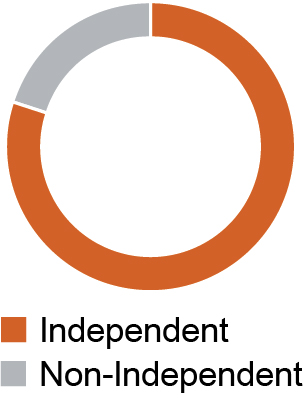



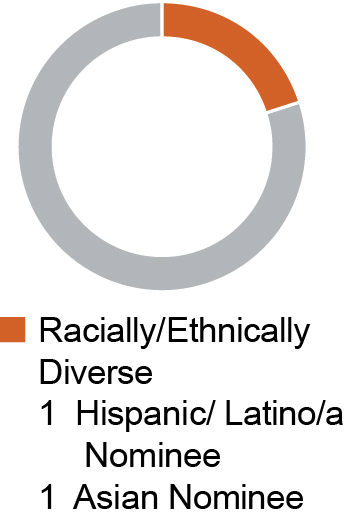






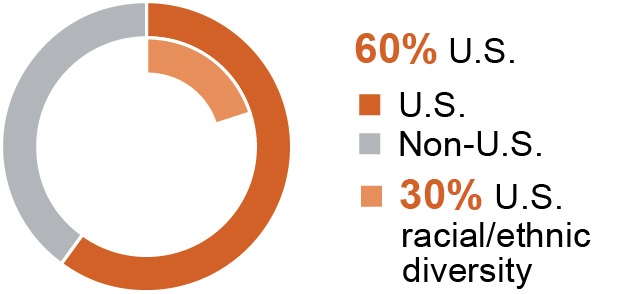

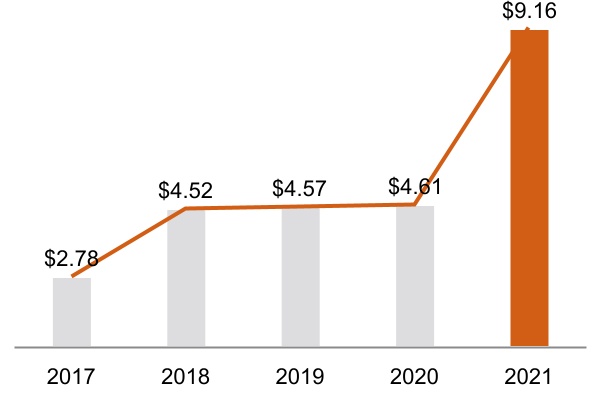

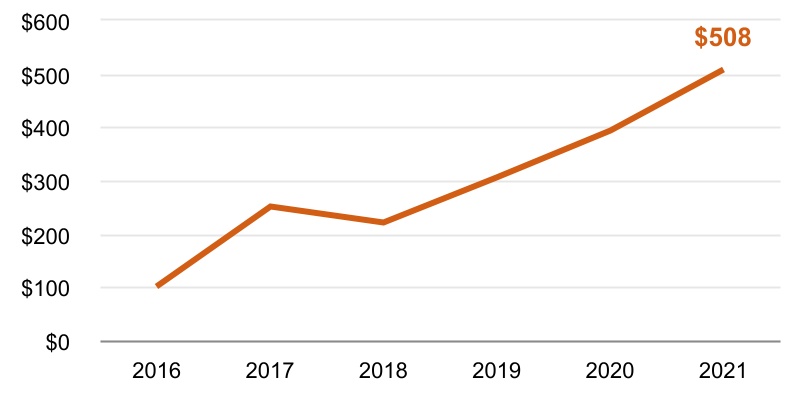
























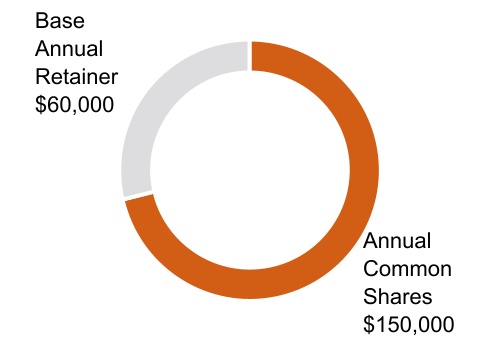





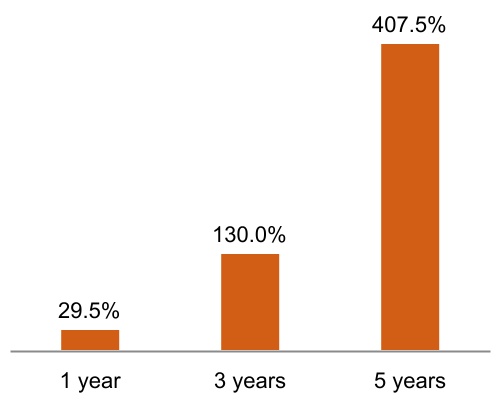
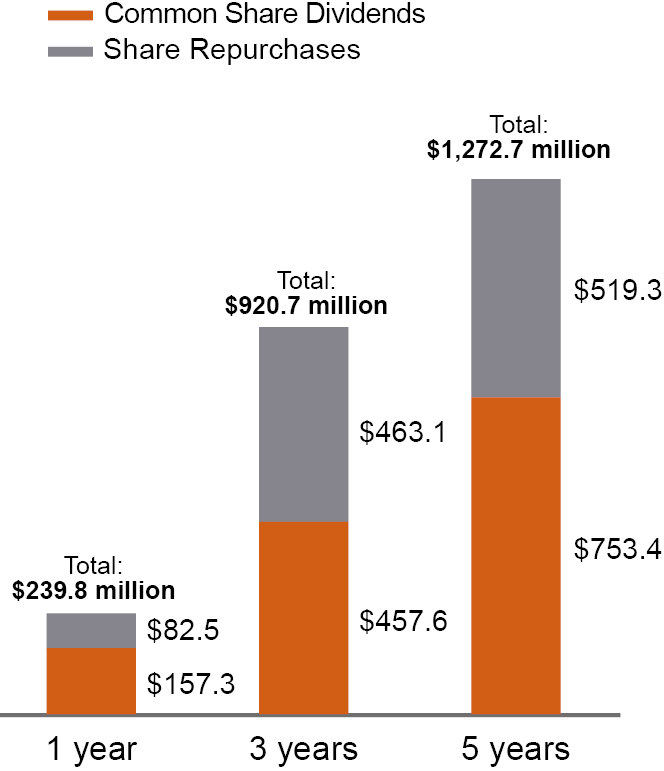
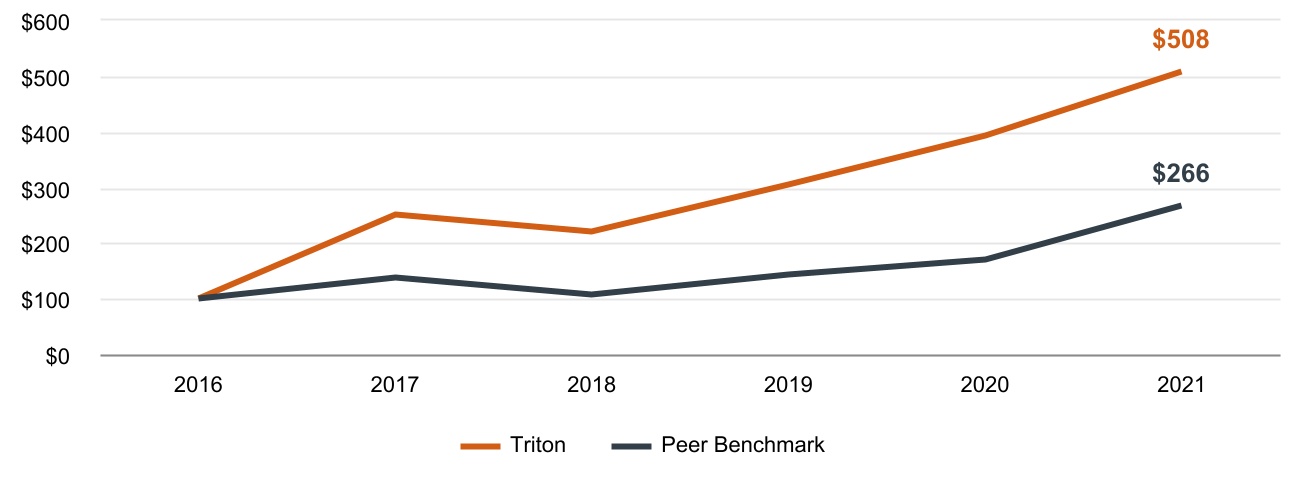

 Link a substantial portion of executive pay to Company performance through our annual and long-term incentive plans
Link a substantial portion of executive pay to Company performance through our annual and long-term incentive plans We do not provide single-trigger change-in-control provisions
We do not provide single-trigger change-in-control provisions